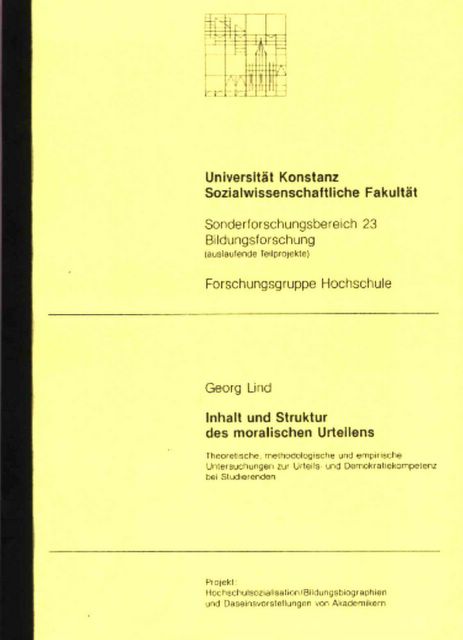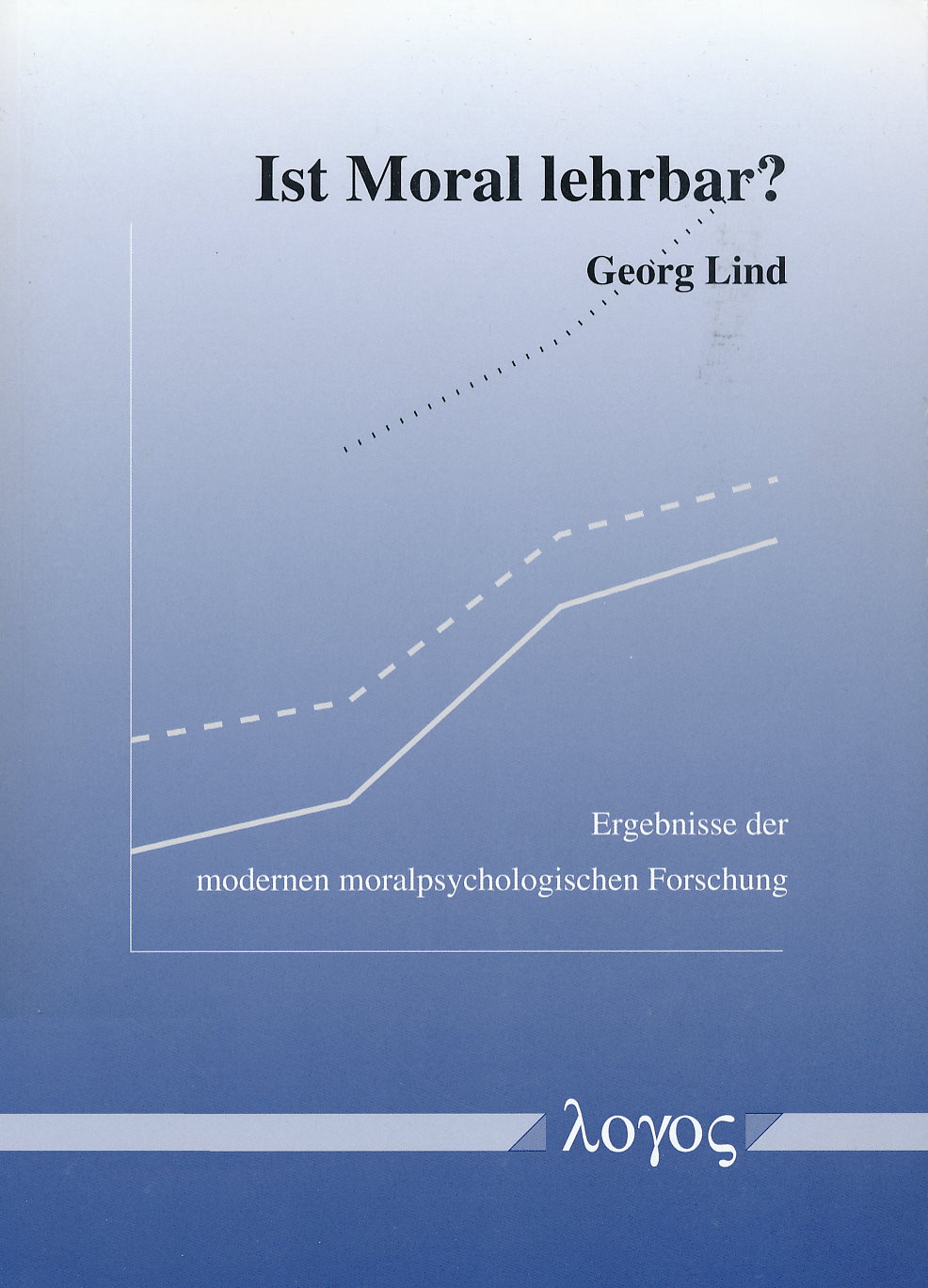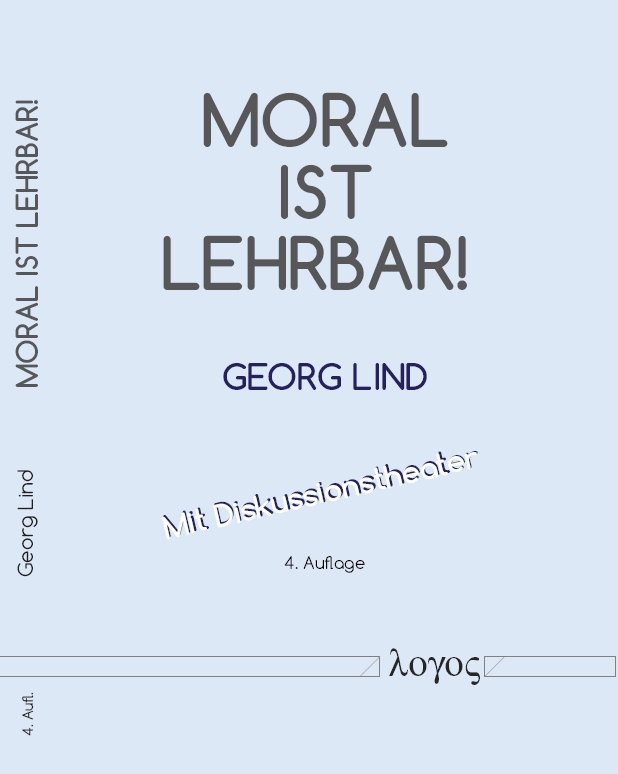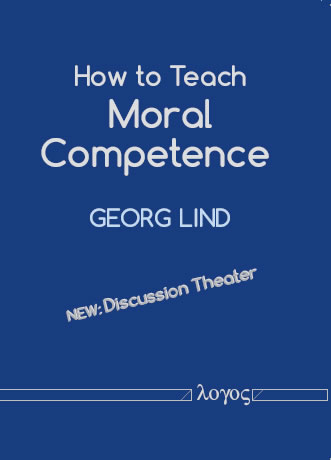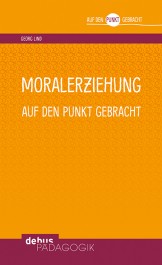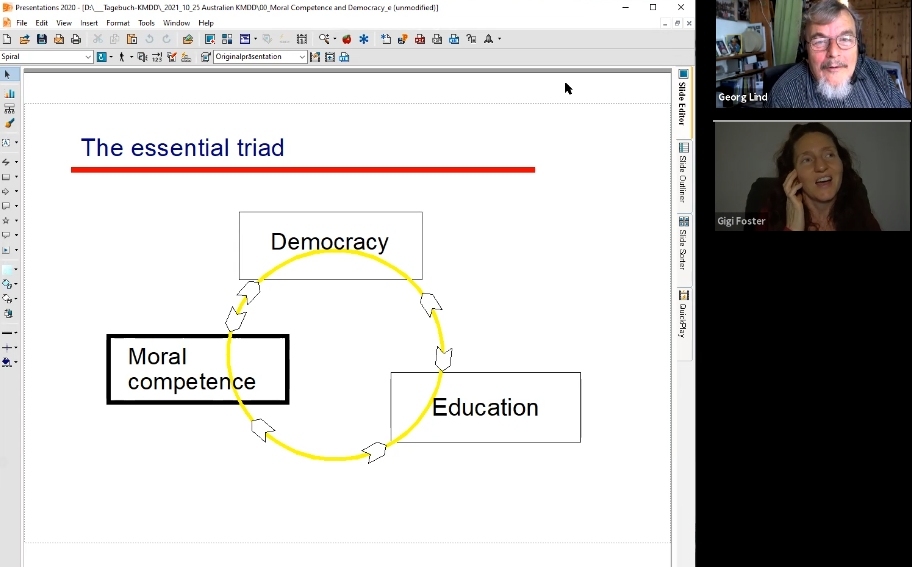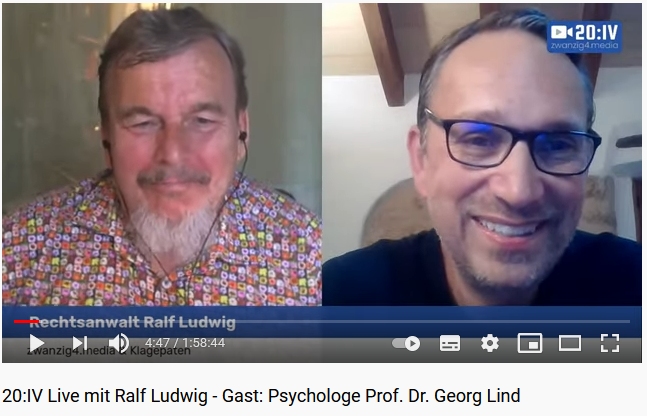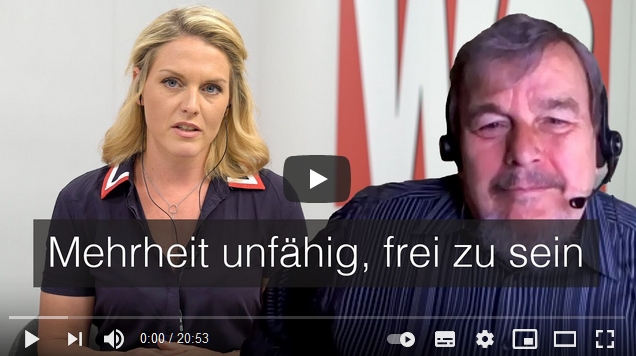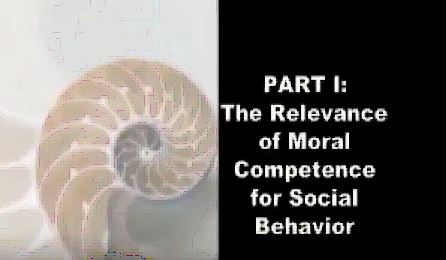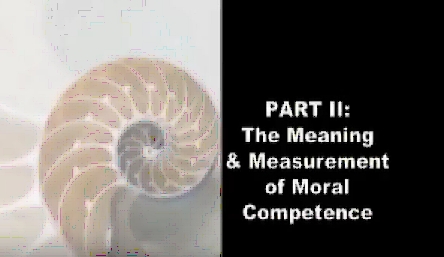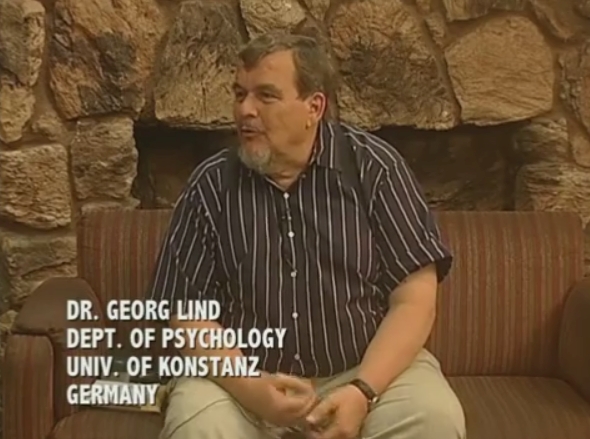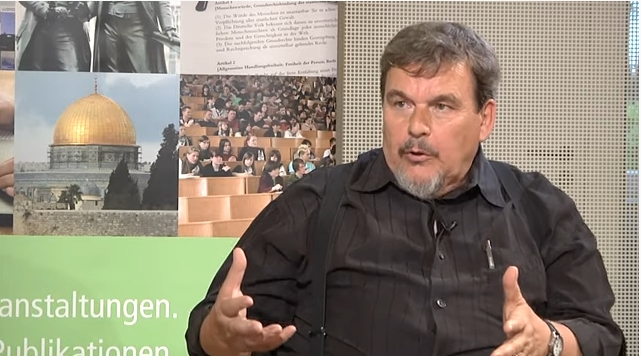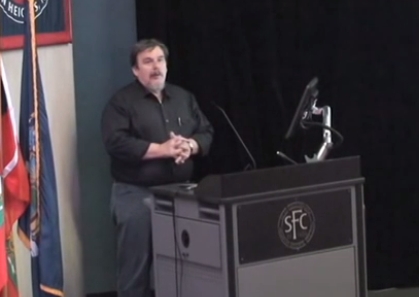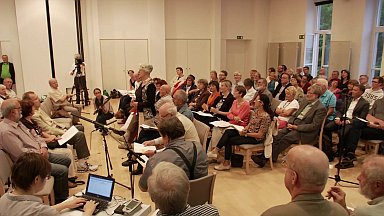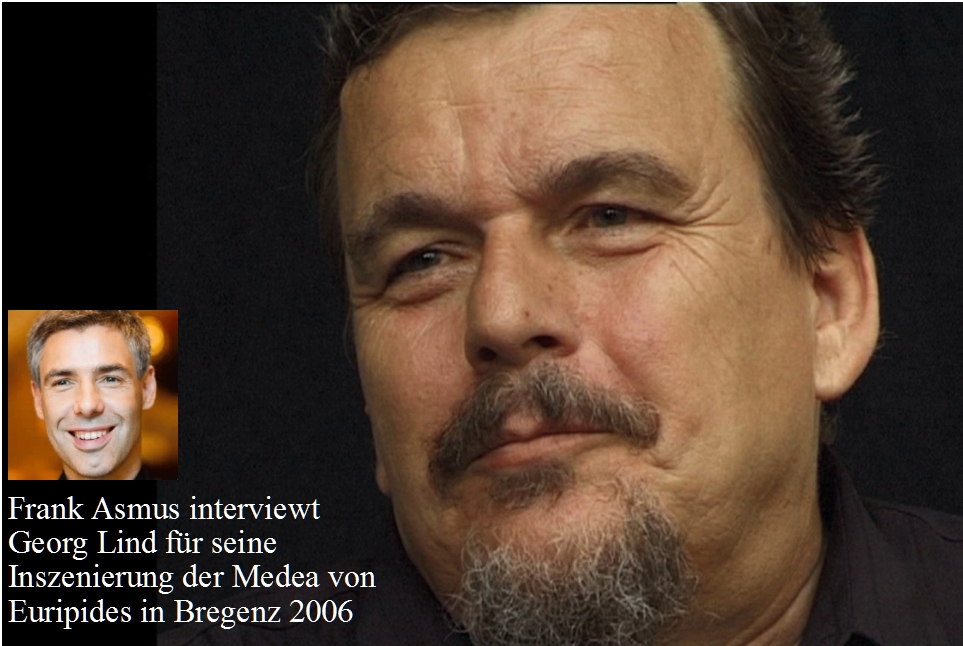|
Sandberger,
J.-U. & Lind, G. (1975). The outcomes of university education: Some empirical
findings on aims and expectations in the Federal Republic of Germany. Higher
Education 8, pp. 179-203. |
|
|
| Lind,
G. (1978). Wie misst man moralisches Urteil? Probleme und alternative Möglichkeiten
der Messung eines komplexen Konstrukts. [How does one measure moral judgment?
[renamed as moral competence.] Problems and alternative possibilities of measuring a complex construct]. In G. Portele,
ed., Sozialisation und Moral. [Socialization and Morality]. Weinheim:
Beltz, pp. 171-201. |
|
|
| Lind,
G. (1978). Der 'Moralisches-Urteil-Test' (m-u-t). Anleitung zur Anwendung und
Weiterentwicklung des Tests. [The Moral Judgment Test. Manual for the test's application
and revision]. In L.H. Eckensberger, ed., Entwicklung des moralischen Urteils
- Theorie, Methoden, Praxis. [The development of moral judgment - Theory,
Methods, Practice]. Saarbrücken. University print, pp. 337 - 358. |
|
|
| Lind,
G. (1978). Persönlichkeit, moralisches Urteil und Ideologie — Ein Versuch
der Kreuzvalidierung der Alker-Poppen-Studie bei Abiturienten. [Personality, moral
judgment and ideology — An attempt to cross-validate the Alker-Poppen-Study
of high school graduates]. In L.H. Eckensberger, ed., Bericht über den
31. Kongress der Dt. Gesellschaft für Psychologie. [Report on the 31st
Congress of the German Association of Psychology]. Göttingen: Hogrefe, pp. 309 - 312. |
pdf-v
|
|
| Lind,
G. (1980). Zum Stand der Moral Judgment-Forschung. Überlegungen zum Gehalt
und zur Bewährung von Kohlbergs Theorie. [On the state of art in moral judgment
research. Thoughts on the empirical content and corroboration of Kohlberg's theory].
In R.K. Silbereisen, ed., Newsletter Soziale Kognition 3, 1979/80 .
Berlin: Technische Universität, pp. 75 - 85. |
pdf-v
|
|
Lind,
G. & Wakenhut, R. (1980c). Erfassung von moralischem Urteil mit standardisierten
Fragebogen. [The assessment of moral judgment with a standardized questionnaire].
In G. Schmitt, ed., Individuum und Gesellschaft in der politischen Sozialisation. [Individual and Society in political socialization]. Tutzing: Akademie für
Politische Bildung, pp. 191 - 220. For a more recent description of the Moral Comptence Test (MCT) see Lind (2019) |
|
|
| Lind,
G. (1980). Kohlbergs Theorie der Moralentwicklung: Einige Ergänzungen zu
dem Beitrag von Hans Bertram. Psychologie heute, 1980. |
|
|
| Lind,
G. (1981). Die Rolle von Fachinteressen von Abiturienten bei der Entscheidung
für Ausbildung und Beruf. [The role of subject interest in the process of
choosing education and the field of occupation]. In H. Peisert, ed., Abiturienten
und Ausbildungswahl. [High school graduates and educational choice]. Weinheim:
Beltz, pp. 155 - 178. |
pdf-v
|
|
| Lind,
G. (1981). Objektiv sachgerecht und individuell zumutbar? Die Folgen des Numerus
clausus. [Objectively reasonable and individually acceptable? The consequences
of Numerus clausus]. In H. Peisert, ed., Abiturienten und Ausbildungswahl.
Weinheim: Beltz, pp. 199 - 217. |
pdf-v
|
|
| Lind,
G. (1981). Kognitiv-strukturelle Analysen von politischen Einstellungsstrukturen.
Überlegungen und Befunde aus dem Forschungsprojekt Hochschulsozialisation.
[Cognitive-structural analyses of political attitudes. Thoughts and findings from
the research project 'Socialization in Higher Education']. In H.-D. Klingemann
& M. Kaase, eds., Sonderheft 12 der Politischen Vierteljahresschrift 22,
pp. 74 - 86. |
pdf-v
|
|
| Lind,
G. (1981). Die zwei Ansätze der Erfassung der Identität und ihre Integration.
Zum Dilemma der Hochschulsozialisationsforschung. [Two approaches to the assessment
of identity and integration. On the dilemma of research into higher education].
In I. Sommerkorn, ed., Identität und Hochschule. [Identity and university].
Hamburg: Arbeitsgemeinschaft für Hochschuldidaktik, pp. 134 - 152. |
pdf-v
|
|
| Lind,
G. (1981). Zur Relevanz der Erforschung des Moralischen Urteils. [On the importance
of research into moral judgment]. HASMU-Bulletin 1/81, pp. 15 - 17. | |
|
| Lind,
G. (1982). Experimental Questionnaires: A New Approach to Personality Research.
In A. Kossakowski & K. Obuchowski, eds., Progress in Psychology
of Personality. Amsterdam: North-Holland, pp. 132 - 144. |
pdf-v
|
|
| Lind,
G. (1982). Der 'Moralisches-Urteil-Test' (m-u-t) [neuer Name: Moralische Kompetenz-Test (MKT)] in der Kritik - Eine Replik auf
Schmieds Analyse. [Criticism of the Moral Judgment Test- A rejoinder to Schmied's
analysis]. Test Diagnostica 28, pp. 80 - 89. |
pdf-v
|
|
Lind,
G. (1984). Moralisches-Urteil-Test, MUT. [The Moral Judgment Test, MUT -- renamed as: Moral Competence Test]. In J.
Allmendinger, P. Schmidt & B. Wegener, eds., ZUMA-Handbuch sozialwissenschaftlicher
Skalen. [ZUMA-Handbook of social scientific scales]. Section D-07, S. 1 - 12.
Mannheim: Zentrum für Umfragen, Methoden und Analysen. (For a newer reference, see Lind 2019). |
pdf-v
|
|
| Lind,
G. (1983). Moral. [Morality]. In E. Lippert & R. Wakenhut, eds., Handwörterbuch
Politische Psychologie. [Dictionary of Political Psychology]. Opladen: Westdeutscher
Verlag, pp. 196 - 204. |
pdf-v
|
|
| Lind,
G. (1984). Theorie und Validität des ´Moralisches Urteil-Tests´ - Zur Erfassung
kognitiv-struktureller Effekte der Sozialisation. [Theory and validity of the
Moral Judgment Test -- renamed as: Moral Competence Test]]. In G. Framhein & J. Langer, eds., Student und Studium
im interkulturellen Vergleich.
Klagenfurt: Kärntner Druck- und Verlagsgesellschaft, pp. 166 - 187. |
pdf-v
|
|
| Lind,
G. & Lind, O. (1984). Demokratie und moralische Urteilskompetenz. [Democracy
and moral judgment competence]. Vierteljahresschrift für Sicherheit und
Frieden 2, pp. 2 - 7. |
pdf-v
|
|
| Lind,
G. (1986). Cultural differences in moral judgment competence? A study of West
and East European university students. Behavior Science Research 20,
pp. 208-225. |
pdf-v
|
|
| Lind,
G. (1986). Parallelität von Affekt und Kognition in der moralischen Entwicklung.
[Parallelism of affect and cognition in moral development]. In F. Oser, W. Althof
& D. Garz, eds., Moralische Zugänge zum Menschen - Zugänge
zum moralischen Menschen. München:
Peter Kindt, S. 158 - 179. |
|
|
Lind, G. (1987). Soziale Aspekte des Lernens: Ambiguitäts-Toleranz. In: B. Dippelhofer-Stiem & G. Lind, Hg.,
Studentisches Lernen im Kulturvergleich, S. 71-87. Weinheim: Deutscher Studienverlag. |
pdf-v
|
|
| Lind,
G. (1987). Moral competence and education in democratic society. In G. Zecha &
P. Weingartner, eds., Conscience: An Interdisciplinary Approach, pp. 91-122.
Dordrecht: Reidel. |
pdf-v
|
|
| Lind,
G. (1987). Kohlberg auf dem Prüfstand — Ein fiktives Gespräch
über Schule, Demokratie und kognitiv-moralische Entwicklung. [Benchmarking
Kohlberg — A fictitious conversation on schools, democracy and cognitive-moral
development]. In G. Lind & J. Raschert, eds., Moralische Urteilsfähigkeit. Weinheim: Beltz, S. 93 - 111. |
pdf-v
|
|
| Lind,
G., Grocholewska, K. & Langer, J. (1987). Haben Frauen eine andere Moral?
Eine empirische Untersuchung von Studentinnen und Studenten in Österreich,
Deutschland und Polen. [Do women have a different morality? An empirical study
of male and female university students in Austria, Germany and Poland]. In L.
Unterkirchner & I. Wagner, eds., Die andere Hälfte der Gesellschaft.
Soziologische Befunde zu geschlechtsspezifischen Formen der Lebensbewältigung. Wien: Verlag des Österr. Gewerkschaftsbundes, pp. 394-406. |
pdf-v
|
|
| Lind,
G. (1989). Die Entwicklung moralischer Gefühle durch Vernunft und Dialog.
[The development of moral emotions through reasoning and dialogue]. In G. Lind
& G. Pollitt-Gerlach, eds., Moral in 'unmoralischer' Zeit. Zu einer
partnerschaftlichen Ethik in Erziehung und Gesellschaft. [Morality in 'amoral'
times. On a cooperative ethics in education and society]. Heidelberg: Asanger,
pp. 7 - 32. |
pdf-v
|
|
| Lind,
G. (1989). Systemanforderungen in den Geistes- und Sozialwissenschaften. [System
requirements in the humanities and social sciences]. In K. Dette, ed., Microcomputer-Pools
in der Lehre. [Microcomputer-Pools in higher education]. Berlin: Springer,
S. 95 - 102. |
|
|
| Lind,
G. (1989). Essay Review: 'The measurement of moral judgment' by Anne Colby, Lawrence
Kohlberg. Human Development 32, 388 - 397. |
pdf-v
|
|
| Lind,
G. (1990). Download - und was dann? Zur Weiterverarbeitung von Literaturrecherchen
von CD-ROM. [Download - and then? On processing literary research from CD-ROM].
In W. Lehmler, ed., CD-ROM: Endnutzerrecherchen in Literaturdatenbanken.
[CD-Rom: Final user search in literary data bases]. Berlin: Deutsches Bibliotheksinstitut, S. 173 - 186. |
|
|
| Lind,
G. (1991). Moralische Entwicklung in betrieblichen Organisationen. [Moral development
in corporate organizations]. In H. Steinmann & A. Löhr, eds., Unternehmensethik. [Corporate ethics]. Stuttgart: C.E. Poeschel, S. 299 - 314. (Second edition). |
pdf-v
|
|
| Lind,
G. (1992). Rekonstruktion des Kohlberg-Ansatzes: Das Zwei-Aspekte-Modell der Moralentwicklung.
[Reconstruction of the Kohlberg approach: The Dual-Aspect Model of moral development].
In F. Oser & W. Althof, eds., Moralische Selbstbestimmung.
[Moral Self-determination]. Stuttgart: Klett-Cotta, S. 204 - 208. |
pdf-v
|
|
| Lind,
G. & Althof, W. (1992). Does the Just Community experience make a difference?
Evaluation and evidence of the effect size of the German program. Moral Education
Forum, pp. 19-28. |
pdf-v
|
|
| Lind,
G. (1993). Moralerziehung als demokratische Bildung. [Moral education as democratic
formation]. Politisches Lernen 2/1993, 20 - 26. |
pdf-v
|
|
| Lind,
G. (1994). Demokratie und Erziehung in der Schule: Ausgangslage und Ziele des
DES-Projekts in Nordrhein-Westfalen. [Democracy and Education in Schools: Starting
point and aims of the DES project in Northrhine-Westfalia]. Qualität
von Schule, Heft 7. Wiesbaden: Hessisches Institut für Bildungsplanung
und Schulentwicklung, S. 19-25. |
pdf-v
|
|
| Lind,
G. (1994). Wirksamkeit von Ansätzen zur Förderung der moralisch-demokratischen
Urteilskompetenz nach Lawrence Kohlberg. [Efficiency of Kohlbergian approaches
to the fostering of moral-democratic judgment competence]. Qualität von
Schule, Heft 7. Wiesbaden: Hessisches Institut für Bildungsplanung und
Schulentwicklung, S. 73 - 84. |
|
|
| Lind,
G. (1994). Moralische Bildung im beruflichen Bereich. [Moral education in the
vocational domain]. Gewerkschaftliche Bildungspolitik 1/94, 18-21. |
pdf-v
|
|
| Lind,
G. (1994). Jugendliche Gewalt - Fakten und Fiktionen. [Juvenile violence - Facts
and fictions]. Politisches Lernen 1.2/1994, S. 25 - 37.
|
pdf-v
|
|
| Lind,
G. (1994). Az erkölcsi érzelmek értelemmel é dialógussal
történó fejlesztése. [The development of moral emotions
through reasoning and dialogue]. In I. Vári-Szilágyi, ed., Az
erkölcs a mindennapokban a nézó és a résztvevó,
az egyén és a közösség perspektivájából.
Budapest: Scientia Humana Foundation, pp. 43-59. | |
|
| Steffen,
U., Bargel, T. & Lind, G. (1994). Demokratische Erziehung und Gemeinschaft
in der Schule - Einleitung in das Themenheft. [Democratic education and community
in schools - Introduction to the Special Issue]. Qualität von Schule,
Heft 7. Wiesbaden: Hessisches Institut für Bildungsplanung und Schulentwicklung,
S. 3 - 17. |
|
|
| Lind,
G. (1995). What do educators know about their students? A study of pluralistic
ignorance. In R. Olechowski & G. Svik, eds., Experimental Research
on Teaching and Learning. Frankfurt, Bern: Peter Lang, pp. 221 - 243. |
pdf-v
|
|
| Lind,
G. (1995). Förderung demokratischer Kompetenzen in der beruflichen Ausbildung.
[Fostering of democratic competencies in occupational education]. Special Series:
Schulstruktur und Schulentwicklung, Heft 6, Pädagogisches Landesinstitut
Brandenburg, S. 50-56. |
pdf-v
|
|
| Lind,
G. (1995). Der Kohlberg-Ansatz - Einführung. [The Kohlbergian approach -
An introduction]. PZ-Information 18/95, Pädagogisches Zentrum Rheinland-Pfalz,
volume 1, 128 - 146. (Reprint from Lind & Raschert, 1987). | |
|
| Lind,
G. (1996). Leading a moral dilemma discussion. In L. Nucci, ed., Web-Site of the
Institute for Moral and Character Education, University of Illinois. Chicago.
(http://www.uic.edu:80/~lnucci/MoralEd/practices.html
). New, revised edition: http://moralcompetence.net/moral/dildisk.htm
|  |
|
| Lind,
G. (1998). Gewalt und Krieg als niedrigste Stufe der Konfliktbewältigung.
[Violence and war as the lowest stage of conflict resolution]. In W. Kempf &
I. Schmidt-Regener, eds., Krieg. Nationalismus, Rassismus und die Medien.
[War. Nationalism, Racism and the media]. Münster: LIT-Verlag, S. 273 - 282. |
pdf-v
|
|
| Lind,
G. (1999). Zur Messung sozialer Motivation in der BIJU-Studie. [On the measurement
of social motivation]. In GGG-Gemeinnützige Gesellschaft Gesamtschule-NW.
http://www.GGG-NRW.de/Lager/Lind9909.html
|
pdf |
|
| Lind,
G. (2000). Are helpers always moral? Empirical findings from a longitudinal study
of medical students in Germany. In A.L. Comunian & U. Gielen, eds., International
perspectives on human development. Lengerich: Papst Science Publishers, pp.
463 - 477. |
pdf-v
|
|
|
Lind, G. (2000). O significado e medida da competência
moral revisitada: Um modelo do duplo aspecto da competência moral . [The
meaning and measurement of moral judgment competence revisited — A dual-aspect
model]. Psicologia: Reflexão e Critica, 13(3), 399 - 416. (ISSN 0102-7972). Portoguese |
pdf-v
|
bis hier |
| Lind,
G. (2000). Moral regression in medical students and their learning environment.
Revista Brasileira de Educacao Médica, 24(3), 24 - 33. |
pdf-vg
|
|
| Lind,
G. (2000). The importance of role-taking opportunities for self-sustaining moral
development. Journal of Research in Education 10(1), 9 - 15. (Extended
draft in pdf format). |
pdf-vg
|
|
| Lind, G. (2000e, in press).
From Practice to Theory - Turning Teacher Education on its Feet. Lyon: Fondation
des Régions Européennes pour la recherche en Education et Formation
(FREREF).. |
pdf-vg
|
|
| Lind,
G. (2000). Moral unterrichten wie Mathe. Professor Georg Lind hält Moral
für lehrbar - Pädagogen sollten sie mit Schülern üben. [Teaching
morality like mathematics. Prof. Georg Lind believes that morality is teachable].
Südkurier, 18.10.2000. |
pdf-vg
|
|
| Lind,
G. (2001). Bio-Ethik. Förderung der moralischen Urteils- und Diskursfähigkeit.
Studienbrief. Fernstudienzentrum, Universität Karlsruhe. | |
pdf |
| Lind, G. (2003). Aprender para convivir. Altablero No. 19, Abril,
2003.
http://www.mineducacion.gov.co/1621/article-87466.html |
|
pdf |
| |
|
|
| Lind, G. (2004). Jenseits
von PISA — Für eine neue Evaluationskultur. In: Institut
für Schulentwicklung PH Schwäbisch Gmünd, ed., Standards, Evaluation
und neue Methoden. Reaktionen auf die PISA-Studie, pp. 1 - 7. Baltmannsweiler: Schneider
Verlag Hohengehren. |
pdf-vg |
|
| Lind, G. (2004). Evaluating
civic competencies: Toward good assessment practice. Paper prepared for the IBE/GTZ
seminar "Determining Good Practice in Learning to Live Together",
held from 9 to 11 December 2003, in Geneva, Switzerland. |
pdf-vg |
|
| Lind,
G. (2004). Erfahrungen mit Standards in den USA – eine Übersicht. In:
U. Hameyer & H.-G. Rolff, eds., Standards. Journal für Schulentwicklung,
Heft 4/2004, pp. 55-60. (Literaturnachweise) |
pdf-vg |
pdf |
| Lind,
G. (2004). Unterstützung und Herausforderung: die Konstanzer Methode der
Dilemmasdiskussion. In: Landesinstitut für Schule, ed., Erziehungskultur
und soziales Lernen. Soest: LSW, pp. 82-108. |
|
pdf |
Lind,
G. (2004). Evaluando las competencias cívica: Hacia una buena práctica
de evaluación. Altablero. El periódico de una país
que educa y que se educa. Ministerio de Educación Nacional, Republica Colombia,
Febrero-Marzo 2004. (http://www.mineducacion.gov.co/index2.html -> Altablero,
Archivo -> Buscar "Evaluando las competencias").
http://www.mineducacion.gov.co/1621/article-87300.html |


|
|
Lind, G. (2004).
Objetivos de la discusión de dilemas. Altablero, El periódico de
un país que educa y que se educa, Feb.-Marzo 2004. (http://www.mineducacion.gov.co/index2.html
-> Altablero, Archivo -> Buscar "discusión de dilemas").
http://www.mineducacion.gov.co/1621/article-87285.html |
 |
|
| Lind,
G. (2005). Verbesserung der Lehre durch Selbstevaluation? Bildung & Wissenschaft,
April 2005, p. 22. |
pdf-vg |
pdf |
| Lind,
G. (2005). Moral Dilemma Discussion Revisited - The Konstanz Method. Europe's
Journal of Psychology, February 2005 http://www.ejop.org. |
pdf-vg |
pdf |
| Lind, G., (2005). Schwierigkeit mit der Demokratie. Antanas Mockus, Ex-Ministerpräsident des Distrikts von Bogotá, im Interview mit Prof. Georg Lind. uni'con -- Universität Konstanz, 20/2005. |
 |
|
| Lind,
G. (2005). Verfehlte Evaluationspolitik? In: Grundschule aktuell. Zeitschrift
des Grundschulverbandes, 92, Nov. 2005, p. 27. |
 |
|
| Lind, G. (2005). Moral Judgment Competence and Religiosity. In: J. M. Fernández & C. Moreno, eds., Foro electrónico: 'El desarollo du una concienca ética laica.' Senderos, Numero 1:
Publicaciones Ocasionales de Investigación del Comité Regional Norte de Cooperación con la UNESCO, August 2005. |
pdf-vg |
pdf |
| Lind, G. (2005). Los dilemas y la ciudadanía. In: P. F. Casas & C. T. Velásquez, ed., Comprensiones sobre ciudadanía. Veintitrés expertos internacionales conversan sobre cómo construier ciudadanía y aprender a entenderse, pp. 93-103. Bogotá: Ministerio de Educación Nacional, República Colombia. |
 |
|
| Lind, G. (2006). Das Dilemma liegt im Auge des Betrachters. Zur Behandlung bio-ethischer Fragen im Biologie-Unterricht mit der Konstanzer Methode der Dilemmadiskussion. Praxis der Naturwissenschaften. Biologie in der Schule, Januar, 1/55, 2006, pp. 10 - 16. |
|
pdf |
| Lind, G. (2006). Effective moral education: The Konstanz Method of Dilemma Discussion. Hellenic Journal of Psychology, 3, 189 - 196. |
|
pdf |
Lind, G. (2006). Ein lebenslanges Dilemma. Moral muss man lernen - so früh wie möglich. Interview mit Lisa Zimmermann. Fluter, Magazin der Bundeszentrale für Politische Bildung,
http://www.fluter.de/look/article.tpl?IdLanguage=5&IdPublication=2&NrIssue=44&NrSection=11&NrArticle=4583 (9.1.2006) |
pdf-vg |
pdf |
| Lind, G. (2006). The Moral Judgment Test [renamed as: Moral Competence Test]: Comments on Villegas de Posada’s Critique. Psychological Reports, 98, 580-584. |
|
pdf |
| Lind, G. (2006). Ohne bessere Lehrerbildung geht es nicht. b&w Juni 2006, p. 21 |
pdf-vg |
pdf |
| Lind, G. (2006). Sitzenbleiben. Sanktionsmittel statt Förderung. Bildung & Wissenschaft Juli/August 2006, p. 19 |
pdf-vg |
pdf |
| Lind, G. (2006). Perspektive "Moralisches und demokratisches Lernen". In: A. Fritz, R. Klupsch-Sahlmann & G. Ricken, eds., Handbuch Kindheit und Schule. Neue Kindheit, neues Lernen, neuer Unterricht. Weinheim: Beltz, pp. 296-309. |
pdf-vg |
pdf |
| Lind, G. (2006). Teilhabe an der Argumentationsgemeinschaft als Ziel der Bildung:
Die Konstanzer Methode der Dilemmadiskussion. In: E. Grundler & R. Vogt, eds., Argumentieren in Schule und
Hochschule. Interdisziplinäre Studien. Tübingen: Stauffenburg, pp. 167-175. |
pdf-vg |
pdf |
| Lind, G. (2006). Die Kluft zwischen Ideal und Verhalten. Zur Konstanzer Methode der Dilemmadiskussion [The gap between ideals and behavior. On the Konstanz Method of Dilemma Discussion.] zur sache.bw. Evangelische Kommentare zu Fragen der Zeit, 2006/10, pp. 36 - 41. |
pdf-vg |
pdf |
Lind, G. (n.d.) Moralische Dilemma-Diskussion. Bildungsserver Baden-Württemberg:
http://www.schule-bw.de/unterricht/faecher/biologie/material/unterrichtsmaterialien/dilemma/index_html |
|
|
| Lind, G. (2007). Gewissen lernen? Zur Konstanzer Methode der Dilemmadiskussion. In: A. A. Bucher, Hg., Moral, Religion, Politik: Psychologisch-pädagogische Zugänge. Festschrift für Fritz Oser, pp. 101 - 112. Berlkin: LIT Verlag. |
pdf-vg |
|
| Lind. G. (2007). Wozu eigentlich "Offener Unterricht"? Schulmagazin 5 - 10, Feb. 2007, 9 - 12. |
pdf-vg |
|
| Lind, G. (2007). Das Recht des Kindes auf eigene Bildungsziele -- und wie man ihm dazu verhelfen kann. In: Sloot, A. & Nordhoff, U., eds., Nur noch lernen, was verwertbar ist? -- Alternativen zur neoliberalen Schulpolitik. GEW Lüneburg, S. 39-47. |
pdf-vg |
|
| Avetisyan
, M. & Lind, G. (2007). Development of moral competency as the psychological base of the moral education. In: Yerevan Mankavarj, ed., Materials of Russian-Armenian International conference. The Pedagogical education: a view to the future , pp. 234 - 237. Eriwan, Armenia. |
|
|
| Lind, G. (2008 a). Teaching students to speak up and to listen to others: Cultivating moral democratic competencies. In: D. E. Lund & P. R. Carr, eds., Doing democracy and social justice in education: Political literacy for all students, pp. 319 - 335. New York: Peter Lang Publishing. (password = kohlberg) Spanish edition: "Promoviendo las competencias morales y democráticas...] HTML-version with Google translator |
pdf-vg |
pdf |
| Lind, G. (2008 b). The meaning and measurement of moral judgment competence revisited - A dual-aspect model. In: D. Fasko & W. Willis, eds., Contemporary Philosophical and Psychological Perspectives on Moral Development and Education, pp. 185 - 220. Cresskill. NJ: Hampton Press. (password = kohlberg) facsimile version | Draft Chinese translation by Prof. Zang Jing | Note: For e more recent description of the Moral Competence Test (MCT) see: Lind (2019) |
pdf-vg |
|
| Lind, G. (2008). Konstanzer Methode der Dilemma-Diskussion als methodischer Beitrag zur Werteerziehung. In: Bayrisches Staatsministerium für Unterricht und Kultus, Hrsg., Werte machen stark. Praxishandbuch zur Werteerziehung, pp. 45-53. Augsburg: Brigg Verlag. |
pdf-vg |
pdf |
Lind, G. (2009). Amerika als Vorbild?
Erwünschte und unerwünschte Folgen aus Evaluationen. [America as role model? Desired and undesired consequences of evaluation.] In: T. Bohl & H. Kiper., eds., Lernen aus Evaluationsergebnissen – Verbesserungen planen und implementieren, pp. 61 - 79. Bad Heilbrunn: Julius Klinkhardt.(Passwort = kohlberg)
Die vollständige Fassung dieses Artikels inklusiv des nicht publizierten Teils über "Programmevaluation" und neueren Ergänzungen [1.9.2009] ist hier als Download erhältlich (Passwort: 'kohlberg') |
pdf-vg |
pdf |
|
pdf-vg |
pdf |
| Hemmerling, K., Scharlipp, M., & Lind, G. (2009). Die Konstanzer Methode der Dilemma-Diskussion
für die Bildungsarbeit mit Risikogruppen. In: K. Mayer & H. Schildknecht, eds., Handbuch Dissozialität, Delinquenz und Kriminalität -- Grundlagen und Methoden der professionellen Arbeit mit Menschen mit abweichendem Verhalten. Zürich: Schulthess Juristische Medien. |
pdf-vg |
|
| Lind, G. (2009). Umgestaltung der Ausbildung ist notwendig. bildung und wissenschaft (GEW-Baden-Württemberg), Themenheft "Lehrerbildung", Juni 2009. |
pdf-vg |
pdf |
| Lind, G. (2009). Moral- und Demokratiefähigkeit –
Eine Schlüsselkompetenz in und für die Lehrer(aus)bildung. In: b&w Bildung und Wissenschaft der GEW Baden-Württemberg, Sonderheft "Lehrerbildung". |
pdf-vg |
pdf |
| Lind, G. (2009). „Moral kann man lernen“. Interview der Schwäbischen Zeitung, 27.7.2009 |
pdf-vg |
|
| Lind, G. (2009). Die Kunst des friedlichen Streitgesprächs. Interview des uni'kon, 35 / 09 |
pdf-vg |
pdf |
| Lind, G. (2009). Jak uczyc studentów wypowiadania sie sluchania innych? Wzmacnianie kompetencji moralno-demokratycznych. In K. C. Cern, P. W. Juchacz & E. Nowak, red., Edukcja demokratyczna. Ponznan: Universytet Im. Adama Mickiewicza w Poznaniu, pp. 19 - 39. english |
|
|
| Nowak, E. & Lind, G. (2009). Dyskursywna wolnosc a sad moralny. O destruktywnym wplywie stanu wojennego na edukacje demokratyczna wsród studentów (1977-1983). In K. C. Cern, P. W. Juchacz & E. Nowak, red., Edukcja demokratyczna. Ponznan: Universytet Im. Adama Mickiewicza w Poznaniu, pp. 129 - 152. english |
|
|
| Hemmerling, K., Scharlipp, M., & Lind, G. (2009). Dyskusja konstancka jako metoda edukacyjna w grupach wysokiego ryzyka. In K. C. Cern, P. W. Juchacz & E. Nowak, red., Edukcja demokratyczna. Ponznan: Universytet Im. Adama Mickiewicza w Poznaniu, pp. 153 - 164. deutsch |
|
|
| Lind, G. (2009). Konflikte diskursiv und gewaltfrei lösen (Interview). bildung und wissenschaft (GEW-Baden-Württemberg), Sept. 2009, 34 - 35. |
pdf-vg |
pdf |
| Lind, G. (2010). The theory of moral-cognitive development: a socio-psychological assessment. In G. Lind, H.A. Hartmann & R. Wakenhut, eds., Moral Judgment and Social Education. Rutgers, NJ: Transaction Books, second edition.. (1985 publication by Precedent Publishing Inc.), pp. 21-53. Online reading |
pdf-vg |
pdf |
| Lind, G., Sandberger, J.-U. & Bargel, T. (2010). Moral competence and democratic personality. In G. Lind, H.A. Hartmann & R. Wakenhut, eds., Moral Judgment and Social Education. Rutgers, NJ: Transaction Books, second edition. (First edition 1985 by Precedent Publishing), pp. 55-77. Online reading |
pdf-vg |
pdf |
| Lind, G. (2010). Die Förderung moralisch-demokratischer Kompetenzen
mit der Konstanzer Methode der Dilemma-Diskussion. In: B. Latzko & T. Malti, eds., Moralentwicklung und -erziehung in Kindheit und Adoleszenz, pp. 285 - 302.
München: Juventa-Verlag. |
pdf-vg |
|
| Lind, G. & Wakenhut, R. (2010). Testing for moral judgment competence. In G. Lind, H.A. Hartmann & R. Wakenhut, eds., Moral Judgment and Social Education. Rutgers, NJ: Transaction Books, second edition. (First edition 1985 by Precedent Publishing), pp. 79 - 105. Online reading . For a more recent description of the Moral Competence Test (MCT) see Lind (2019) |
pdf-vg |
|
| Lind, G. (2010). Attitude change or cognitive-moral development? How to conceive of socialization at the university. In G. Lind, H.A. Hartmann & R. Wakenhut, eds., Moral Judgment and Social Education. Rutgers, NJ: Transaction Books, second edition.. (1985 publication by Precedent Publishing Inc.), pp. 173 - 192. Online reading |
pdf-vg |
pdf |
| Lind, G. (2011). Moralerziehung. In: Kiel, E. & Zierer, K., Hg: Basiswissen Unterrichtsgestaltung, pp. 51 - 62. Baltmannsweiler: Schneider Verlag Hohengehren. [Password = kohlberg] |
pdf-vg |
|
| Lind, G. (2011). Promoviendo las competencias morales y democráticas: expresarse y escuchar a otros. Postconvencionales, No. 3, marzo 2011, pp. 26 - 41. ISSN: 2220-7333 [English edition: "Teaching students to speak up and to listen to others..."] |
pdf-vg |
|
Lind, G. (2010). Amerika als Vorbild?
Erwünschte und unerwünschte Folgen aus Evaluationen. [America as role model? Desired and undesired consequences of evaluation.] Pädagogik 10/10, 40-45. [Eine umfangreichere Vorfassung dieses Artikels ist hier als Download erhältlich [Passwort = kohlberg] |
pdf-vg |
pdf |
| Lind, G. (2011). Moral education: Building on ideals and fostering competencies
. Contemporary Issues in Education, 2, 1, 45 - 59. [revised English edition of Lind (2011). Moralerziehung... more] |
pdf-vg |
pdf |
| Lind, G. (2010). Gewalt als die niedrigste Ebene der Konfliktlösung, Ethics in Progress Quarterly, 1(1). [2nd edition]
http://ethicsinprogress.org/?page_id=135 [re-publication of Lind, 1998] |
pdf-vg |
pdf |
| Lind, G. (2011). Selbst ist die Schule! Fremd- versus Selbstevaluation. [Self-directed schools! External versus self-evaluation.] Grundschule 4/2011, 24 - 26. |
pdf-vg |
pdf |
Lind, G. (2011). Verbesserung des Unterrichts durch Selbstevaluation. Ein Plädoyer für unverzerrte Evidenz. [Improvement of teaching through self-evaluation. A plea for unbiased evidence.], In: J. Bellmann & T. Müller, eds.: Wissen, was wirkt. Kritik evidenzbasierter Pädagogik, pp. 173 - 195. Wiesbaden: VS-Verlag für Sozialwissenschaften. ISBN 978-3-531-17688-8 |
pdf-vg |
pdf |
| Lind, G. (2011).
Building on ideals and fostering competencies. Sawt al Arab. March 2, 2011. |
pdf-vg |
pdf |
Lind, G. (2011). Editorial: Moral competence and the democratic way of living. Europe's Journal of Psychology, 7, 5, 569 - 596. Go to
|
pdf-vg |
pdf |
| Lind, G. (2011). Ist Moralkompetenz lehrbar? Welche Bildung brauchen ökonomische Entscheidungsträger? In: D. Borchers & G. Müller-Christ, eds., Warum ist ethisches Entscheiden in der Wirtschaft so schwer? 23. Bremer Universitäts-Gespräche am 11.-12.11.2010. www.wolfgang-ritter-stiftung.de/BUG.htm. Isensee Verlag. | Tonaufzeichnung des Vortrags von Nordwest Radio |
pdf-vg |
|
| Lind, G. (2011). Lehrerbildung: Weniger räsonieren, mehr trainieren. bildung & wissenschaft, 1/2011. |
pdf-vg |
pdf |
|
Smiljanic, M. (2011). Warum Menschen grausam handeln. Vor 50 Jahren sorgte das Milgram-Experiment für weltweite Furore. Interviews mit Joachim Bauer, Peter Erb und Georg Lind. Deutschlandradio, Sendung am 7.7.2011. MP3
| Text |
 |
|
| Lind, G. (2011). Die Methode der Dilemmadiskussion. In: Brüggen, F., Sander, W. & Igelbrink, Ch,. eds., Basistexte zur Urteilsbildung (Urteils-Bildung, Bd. 2). Münster: LIT-Verlag. |
pdf-vg |
|
| Lind, G. (2011). Pädagogik oder Struktur? Auch die Hattie-Studie weiß keinen Rat. Hessische Lehrer-Zeitung 11/2011, 26 - 27. (http://vg06.met.vgwort.de/na/307fe0faa3bb423584d3193ad8ddf81e?l=http://moralcompetence.net/pdf/Lind-2011_hattie-studie_kommentar.pdf) |
pdf-vg |
pdf |
| Lind, G. (2012). Moral competence and democratic ways of life. In: W. G. Weber, M. Thoma, A. Ostendorf, & Lynne Chisholm, eds., Democratic competences and social practices in organizations, pp. 62 - 85. Wiesbaden: Spinger VS. |
pdf-vg |
pdf |
| Lind, G. (2013). KMDD - Eine Zauberformel aus Konstanz. Interview mit SeeMoZ, 17.1.2013 ... SeeMoZ |
|
|
| Lind, G. (2013). Wie ist nachhaltige Reform möglich? Über die Erneuerungswut im deutschen Schulwesen. In: b:sl, Beruf: Schulleitung 2:2013, 29-30. |
pdf-vg |
|
Lind, G. (2013). Thirty years of the Moral Judgment Test*: Support for the dual-aspect theory of moral development. In: Claudio Simon Hutz & Luciana Karine de Souza, eds., Estudos e pesquisas em psicologia do desenvolvimento e da personalidade: uma homenagem a Angela Biaggio, pp. 143-170. Sao Paulo, Brasilien: Casa do Psicólogo. [* Now renamed as Moral Competence Test, MCT.] |
pdf-vg |
|
| Lind, G. (2013).
Über das Erlernen professionellen Lehrerverhaltens – Ein Gastbeitrag. Shift - Blog, 27.11.2013 |
pdf-vg
|
pdf |
| Lind, G. (2013). Theorie und Praxis des Begriffs
„Kompetenz“.
Zur Notwendigkeit von Konkretisierungen. Betrifft: Schulleitung (b:sl), 03:2013, 31 - 33. |
pdf-vg |
pdf |
| Nowak, E., Schrader, D. & Zizek, B., eds. (2013), Educating competencies for democracy. Festschrift für Georg Lind. Frankfurt am Main: Peter Lang Verlag. |
|
pdf |
| Lind, G. (2013). Edukacja moralna. Teoria dwuaspektowa. Principia, TOM LVII-LVIII, Kraków, pp. 41 - 56, translated by Karolina Budzinska; edited by Juchacz, P.W., Cern K.M., & Nowak, E. (Polish translation of Lind, 2011). |
|
|
| Lind, G. (2014). Moralische Kompetenz und globale Demokratie. In: M. Tiedemann & J. Rohbeck, Hrsg., Philosophie und Verständigung in der pluralistischen Gesellschaft. Jahrbuch für Didaktik der Philosophie und Ethik, Band 14, pp 192-211. Dresden: Thelem Verlag. |
pdf-vg |
pdf |
Lind, G. (2014). Die Notenpraxis ist nicht demokratie-konform. In: Humane Schule, 40, Dez. 2014, pp. 4 - 5. |
pdf-vg |
pdf |
Lind, G. (2015). Von der Leistungs- zur Lernkultur. Anmerkungen zur Resolution des Grundschulverbands zur Ziffernnoten-Beurteilung. In: Lehren und Lernen, 41, pp. 29 - 32. |
pdf-vg |
pdf |
| Lind, G. & Nowak, E. (2015). Kohlberg’s unnoticed dilemma – The external assessment of internal moral competence? In: B. Zizek, D. Garz & E. Nowak, eds., Kohlberg Revisited, pp 139 - 154. Rotterdam: Sense Publisher. |
pdf-vg |
pdf |
| Lind, G. (2015). Favorable learning environments for moral competence development – A multiple intervention study with nearly 3.000 students in a higher education context. International Journal of University Teaching and Faculty Development, 4, 4. (https://www.novapublishers.com/catalog/product_info.php?products_id=53411) |
pdf-vg |
pdf |
Lind, G. (2015). Förderung der Moralkompetenz im Ethik-Unterricht. In: Lehren und Lernen, 41, 8/9, pp. 59-62.
English extended version ... |
pdf-vg
|
pdf |
|
Lind, G. (2016). Moral braucht guten Unterricht. Erziehung & Unterricht, 04/2016, pp. 26-27. |
pdf-vg |
pdf |
| Lind, G. (2019). Making moral competence visible (Chapter 4 of "How to teach morality") |
pdf-vg
|
pdf |
| Lind, G. (2016). Der Nahsinn-orientierte Ansatz (NorA) der Lerntherapie und -diagnose. Lehren & Lernen, 6/2016, 33-34. |
pdf-vg |
|
| Lind, G. (2016). Gemeinsames Lernen braucht Moralkompetenz. Gemeinsames Lernen, 2016, Heft 4, 42-47. |
pdf-vg |
pdf |
| Lind, G. (2016). Theorie und Praxis des Begriffs "Kompetenz". Zur Notwendigkeit von Konkretisierungen. [Theory and praxis of the concept 'competence'. On the necessity of specifications.] Lehren & Lernen, 10-2016, pp. 16-20. |
pdf-vg |
pdf |
| Lind, G. (2017). Charterschulen ante portas: US-Präsident Donald Trump nominiert Privatisierungs-Aktivistin als US-Bildungsministerin. Lehren & Lernen, 1-2017, 43, 36-38. |
pdf-vg |
pdf |
| Lind, G. (2017). Bildungsstatistik, die wir nicht brauchen. Lehren & Lernen, 2-2017, 13-14. |
pdf-vg |
pdf |
| Lind, G. (2017). An interview with Georg Lind by Marta Soniewicka, Jagellonian University of Cracow (to appear in "Ethics in Progress"). |
pdf-vg |
|
| Lind, G. (2017). Growth and regression in cognitive-moral development of young university students. In: C. G. Harding, ed., Moral dilemmas and ethical reasoning, pp. 99 - 114. New York: Routledge. (First edition 1985 by Precedent Publ. Inc., Chicago). Online reading |
pdf-vg |
pdf |
| Lind, G. (2017). Soll Schule Werte vermitteln oder Moralkompetenz fördern? Pädagogik, 12/17, 34-37. |
pdf-vg
|
pdf |
| Lind, G. (2017). From Donder's dilemma to objective internal assessment: How experimental developmental psychology can contribute to moral education. Psychologia Rozwojowa, 22, 3, 15–24. doi:10.4467/20843879PR.17.013.7573. www.ejournals.eu/Psychologia-Rozwojowa. |
pdf-vg |
pdf |
| Nowak, E. & Lind, G. (2018). Mis-educative martial law – The fate of free discourse and the moral judgment competence of Polish university students from 1977 to 1983. Ethics in progress 9, 2. DOI: https://doi.org/10.14746/eip.2018.2.5. (reprint). Chinese translation of the first print: |
pdf-vg |
pdf |
丈娃• i苦瓦克井治﹒林德 / 王佐皮@ 淨 (2009). 教育意又不賞的軍事管制法 一1977 年至1983 波三大半生的. 自由表迷和道德判斷能力的命逞。【在】巴fr- 托什遲依切霍夫斯基(Bartosz Wojciechowski), 主為【波】~萊克,芥fr- 克-辭多夫斯基(Marek Zirk-Sadowski) & 【波】~留什. J ﹒哥某英基(Mariusz J. Golecki), 匠活f車間里說性 月2是由芝個. 全球化肘代的法哲掌. 過中園人民大掌出版社 . Torun, Poland: adam maszalek. … more |
|
pdf |
Lind, G. (2018). Diskussions-Theater -- Eine Methode der Demokratieerziehung. In: Lehren & Lernen, S. 24-33.
-- (2019) Discussion Theater. A method for democratic education. Ethics in Progress 10, 1, 23-40. |
eng:
pdf-vg |
pdf
pdf |
Lind, G. (2018). Demokratie-Erziehung. In: "news4teachers": Teil 1 | Teil 2 | Teil 3 | Teil 4
-- Translation: Education for democracy. A moral task of schools in democracy. |
dt.:
pdf-vg
eng:
pdf-vg |
pdf
pdf |
| Lind, G. (2018). Kann die Reformpädagogik von der Bildungsforschung profitieren? In: Lehren & Lernen, Okt, 2018. |
|
pdf |
| Lind, G. (2018). Moralkompetenz. Eine Schlüsselqualifikation fürs Leben und Lernen. In: Praxis Schulpsychologie, Okt. 2018 |
|
pdf |
Lind, G. (2019). How to teach moral competence. New: discussion theater.
Extented second edition. Order: Logos: Berlin. Testimonial and reviews. |
|
|
| Lind, G. (2019). How to make moral competence visible. In G. Lind, How to teach moral competence.... |
pdf-v
|
|
Lind, G. (2019). Moral ist lehrbar.
Mit Diskussionstheater.
Vierte erweiterte Auflage. Berlin: Logos. Bestellung. Rezensionen. |
|
|
| Lind, G. (2019). Moralerziehung.
In: J. Drerup & G. Schweiger, Hg.: Handbuch Philosophie der Kindheit, S. 252.258. Stuttgart: Metzler-Verlag. |
pdf-vg |
pdf |
| Lind, G. (2019). The art of experimental moral psychology. Ideas for studying moral competence and beyond. Work paper. DOI: 10.13140/RG.2.2.18268.64641 |
pdf-vg
|
pdf |
| Lind, G. (2019). Welche Bildungsforschung sollte mehr Beachtung in der Politik finden? Lehren & Lernen 1-2019, 35-37. |
|
pdf |
| Lind, G. (2019). Zwischenruf: Kleine Klassen von großem Gehabe erschlagen. Lehren & Lernen 4-2019, 38-39. |
|
pdf |
| Lind, G. (2019). Krise der Demokratie. Die Psychologie kann helfen. report psychologie 03-2019, 8-10. |
|
pdf |
| Lind, G. (2019). Moralkompetenz wirksam fördern. In: Ziele, Wege, Unruhe. 15 Jahre Winterhuder Reformschule, Eine Festschrift, S. 70-73. Hamburg. (Manuskript) |
|
pdf |
| Lind, G. (2019). Lernstandserhebungen und Diagnosen JA, aber WIE? Eine Kritik der herrschenden Testverfahren und der 'Evidenz'-Basierung. Lehren & Lernen, 5-2019, S. 17-19. |
pdf-v
|
|
| Squenz, Peter [Roland Grüttner] (2019). "People #17: Moral ist lehrbar". |
Link |
|
| Lind, G. (2019). Das Demokratieparadoxon ist mit 'Demokratie leben' nicht zu lösen. Lehren & Lernen, 6-2019, 30-31. |
pdf-v
|
|
| Lind, G. (2020). KMDD & Discussion Theater Training Manual - KTM (engl.). |
pdf-v
|
|
| Lind, G. (2019). Why we need to foster moral competence and how. Presentation at the 13th International Symposium "Moral Competence: Its Nature, Relevance and Teachability." University of Konstanz, July 24-25, 2019. |
pdf-v
|
|
Lind, G. (2020). Panik als gefährliche Seuche. Überlegungen zur ihrer Diagnose und Prävention. |
pdf-v
| |
| Lind, G. (2020). Panik als gefärhliche Seuche. Gewalt, Betrug und Wegschauen oder Unterwerfung. Rationalgalerie. |

| |
| Lind, G. (2020). Panic is a dangerous epidemic. On its diagnosis and prevention. |
pdf-v
|
|
| Lind, G. (2020). El pánico como una enfermedad peligrosa -
Consideraciones preliminares para su diagnóstico y prevención |
pdf-v
/div> |
|
| Lind, G. (2020). Der neuerliche PISA-Rummel: (Nicht nur) die Presse fällt auf PISA-Tricks herein. Lehren & Lernen, 3-2020, 31-35. |
pdf-v
|
|
Lind, G. (2020).
Masken –
Oder warum die Wahrheit so schwer zu finden ist.
--- Masks -
Or Why Truth Is So Hard To Find. [all in one file]
--- Máscaras -
O por qué la verdad es tan difícil de encontrar [all in one file] |
pdf-v
|
|
| Lind, G. (2020). Kritisches Denken und Moralkompetenz in der Demokratie. Im Interview mit Georg Lind sprechen wir über seine Arbeit zur Moralkompetenz, welche eine wichtige Voraussetzung für das Funktionieren einer Demokratie darstellt.
Podcast Kritisches Denken (Veröffentlich am 5.5.2020)<
/font> |
 |
|
| Lind, G. (2020). Gast #40: Investoren gegen die Menschheit. Ein Prozess. Pädagogick (12.6.2020) |
Link |
|
| Lind, G. (2020). Die Welt in Angst. Die Corona-Panik selbst verkommt zur gefährlichen Seuche, die sowohl unsere Bürgerrechte als auch die Meinungsfreiheit bedroht. Rubikon, 18.3.2020. |
Link |
|
| Lind, G. (2020). Von wegen Killervirus. Die Sterblichkeitsrate von COVID-19 wird maßlos überschätzt. Rubikon, 18.3.2020 |
Link |
|
| Kriaučiūniene, R. & Lind, G. (2021). Validation of the Lithuanian version of Moral Competence Test
and application of KMDD in language teaching / learning process
at Vilnius University, Lithuania. Ethics in Progress, 12, 1, 6-14. |
pdf |
|
| Lind, G. (2021). KMDD Training Manual - KTM (engl.). |
pdf-v
|
|
| Lind, G. (2021). KMDD Trainings-Manual - KTM. Konstanzer Methode der Dilemma-Diskussion und Diskussionstheater. (19.1.2021) |
pdf-v |
|
| Lind, G. (2021). Moral competence: what it means and how accountant education could foster it. In: M. Pinheiro & A. O. Costa, eds., Accounting ethics education. London: Routledge. |
pdf-v
|
|
| Lind, G. (2021). Demokratiekompetenz liegt brach. PSYCHOLOGIE HEUTE 02/2021, S. 10. |
pdf-v
|
|
Lind, G. (2021). Die Bedeutsamkeit empirischer Befunde:
Statistische Signifikanz vs. relative vs. absolute Effektstärken.
Earlier version (2014): Effektstärke : Statistische, praktische und theoretische Bedeutsamkeit von empirischen Studien.Überarbeiteter Vortrag. KOPS 2012, Universität Konstanz. Click here for revised versions 2014; überarbeitete Fassung in "Marktforschung - Das Portal für Markt-, Medien- und Meinungsforschung" (Sept. 2014) |
docx |
|
| Lind, G. (2021). Effect size: statistical, practical and theoretical significance of empirical findings. (automated translation of Lind 2021) |
pdf |
|
| Lind, G. (2021). Panic and the lack of moral competence.
How we can help to prevent panic pandemics. Ethics in Progress 12, 1, 84-94. |
pdf |
|
| Lind, G. (2021). Fostering moral competence can help us resist scare tactics. Revised version of "Panic and the lack of moral competence." |
pdf |
|
| Lind, G. (2021). Die Förderung der moralischen Kompetenz kann uns helfen, Panikmache zu widerstehen. In: K.-J. und A. Bruder, Hg.: Corona. Inszenierung einer Krise. Berlin: Verlag Sodenkamp & Lenz, 2022, im Druck |
pdf |
|
| Lind, G. (2021). Making human traits visible, objectively and validly, through experimentally designed questionnaires. Ethics in Progress 12, 1, 15-38.
DOI:10.14746/eip.2021.1.3 |
pdf |
|
| Nowak, E., Barciszewska, A.-M., Lind, G., Hemmerling, K. & Taradi, S. K. (2021). Giving moral competence high priority in medical education. New MCT-based research findings from the polish context. Ethics in Progress, 12, 1, 104-133. |
pdf |
|
| Bruch,
M., Dreesmann, H. & Lind, G. (1973). Untersuchung eines Modells zur Bürgerpartizipation
am Beispiel der Planung des Freizeitzentrums Kirchheimbolanden (Pfalz) . [Investigation
on a model of civic participation using the planninng of the recreational center
Kirchheimbolanden].Unpublished diploma/master thesis. Department of Psychology, University
of Heidelberg. |

|
|
| Lind,
G., Nielsen, A. & Schmidt, U. (1976). Moralisches Urteil und Hochschulsozialisation:
Materialien, Beiträge. [Moral judgment and higher education: materials and
contributions]. Arbeitsunterlage Nr. 40, Forschungsgruppe Hochschulsozialisation.
University of Konstanz. |  |
|
| Lind,
G., Bargel, T. & Sandberger, J.-U. (1976). Die Vermittlung von über-
und außerfachlichen Qualifikationen während des Studiums. [The transmission
of supra- and extra-professional competencies during university study]. Arbeitsunterlage
Nr. 28, Forschungsgruppe Hochschulsozialisation. University of Konstanz. | |
|
| Lind,
G. (1977). Über die Grundlagen einer integrationistischen Messtheorie zur
Erforschung des moralischen Urteils. [On the foundations of an integrationist
theory of measurement for the study of moral judgments]. Arbeitsunterlage
Nr. 41, Forschungsgruppe Hochschulsozialisation. University of Konstanz. |  |
|
| Lind,
G. (1978). Some considerations on change, learning, and development in higher
education. FORM-Document Nr. 35. Vienna: European Coordination Center for
Research and Documentation in Social Sciences. |  |
|
| Lind,
G. et al. (1978). Geschlechterstereotypisierung bei Kompetenzbeurteilung im
Wissenschaftsbereich. Eine Replikation der Goldberg-Studie. [Gender stereotyping
in competence evaluations in the scientific domain. A replication of the Goldberg-Study].
University of Konstanz. Unpublished report. | |
|
| Lind,
G. (1978). Kritik der "Forderungen für die Messung des moralischen Urteils"
von Reinshagen. Konstanz, 1978. | |
|
| Lind, G., ed. (1979). Moralische Entwicklung und soziale Umwelt. Beiträge
für ein Werkstattgespräch. [Moral development and the social environment.
With contributions by Bernd Rotheberger, Ulrich Siegmund, Fritz Oser, Paul Gmünder,
Ulrich Fritzsche, Rainer Döbert, Georg Lind, Roland Wakenhut, Rainer Senger,
Ekkehard Lippert, Ralf Briechle, Hans Brügelmann und Gerhard Portele; Topics:
Moral development, Poverty, Religiosity, Military Services, Political Socialization,
Segmentation of Moral Conscience, Civic Education, Schooling, Law Education, Morality
and Science, Selection Processes, Moral Judgment Test]. University of Konstanz. |
 |
|
| Lind,
G. (1979). Verweigerer und Freiwillige — Einige Befunde zur Handlungsrelevanz
des moralischen Bewußtseins. [Draft resisters and volunteers — Some
finding on the relevance of moral judgment for human actions]. In G. Lind, ed.,
Moralische Entwicklung und soziale Umwelt. Beiträge für ein Werkstattgespräch.[Moral development and the social environment]. University of Konstanz.,
pp. 40-45. |
 |
|
| Lind,
G. (1979). Sozialisation versus Selektion — Empirische Nachlese zum Zusammenhang
zwischen Moral und Standardisierungsgrad der Umwelt. [Socializationa versus selection
— Empirical notes on the relationship between morality and the degree of
standardization of the environment]. In G. Lind, ed., Moralische Entwicklung
und soziale Umwelt. Beiträge für ein Werkstattgespräch. [Moral
development and the social environment]. University of Konstanz, March 30, 1979,
pp. 88-95. |  |
|
| Sandberger,
J.-U., Lind, G. & Bargel, T. (1979). Rationalität, Kritikfähigkeit,
Autonomie und Verantwortungsbereitschaft als übergreifende Konzepte in der
Analyse von Hochschulsozialisation. [Rationality, critical ability and sense of
responsiblity as overarching concepts for the analysis of higher education]. Arbeitsunterlage
Nr. 58, Forschungsgruppe Hochschulsozialisation. University of Konstanz. | |
|
| Lind,
G. (1980). Reliability of test or structure of personality? Empirical findings
on the problem of interpreting judgment consistency. Paper presented at the FORM-meeting
in Portoroz, Yugoslavia, March 28-30, 1981. FORM-Document Nr. 88.
Vienna: European Coordination Center for Research and Documentation in Social
Sciences, 1980. | |
|
| Lind,
G. (1980). Zur Bestimmung des Entwicklungsstandes der moralischen Urteilskompetenz
beim Übergang vom Gymnasium auf die Universität. [On the assessment
of the level of moral development at the transition from high school to university].
In J. Domnick, ed., Aspekte grundlagenorientierter Bildungsforschung.
[Aspects of basic oriented educational research]. Forschungsbericht Nr. 38, Zentrum
I Bildungsforschung/SFB 23. Universität Konstanz, pp. 151-166. |  |
|
| Lind,
G. (1980). Entwicklung der studentischen Persönlichkeit: Zur Theorie und
Methode der Sozialisationsforschung. [Development of Students' Personality: On
theory and practice of socialization research.] Arbeitsunterlage. 67, Zentrum
I Bildungsforschung/SFB 23. Universität Konstanz. |
 |
|
| Lind,
G. (1982). Fachinteressen im Prozeß der Ausbildungsentscheidung am Beispiel
des Medizinstudiums. Ergebnisse des Abiturienten Follow-up. [The role of subject
interest in the process of career choice in medical education. Findings of follow-up
studies of high school graduates]. Arbeitsunterlage 72, Projekt Hochschulsozialisation.
SFB 23. University of Konstanz. 2nd edition. |  |
|
| Lind,
G. & Keller, F. (1982). Intra-individuelle Varianzkomponentenzerlegung der
Antwortmuster des 'Moralisches-Urteil-Tests'. Algorithmus für das Programmsystem
KOSTAS. [Intra-individual analysis of variance components for the Moral Judgment
Test]. Arbeitsunterlage Nr. 65, Forschungsgruppe Hochschulsozialisation.
University of Konstanz. | |
|
| Lind,
G. (1983). Moralische Urteilskompetenz und berufliche Ausbildung. [Moral judgment
competence and vocational education]. Berichte zur Erziehungswissenschaft
Nr. 36. Pädagogisches Institut. Universität Fribourg. Schweiz.
Zweite Auflage 1985. |  |
|
| Keller,
F. & Lind, G. (1983). Skalenanalyse - SAM. [Scale Analysis - SAM]. In W. Nagl,
H.-G. Walter & J.L. Staud, Ed(s)., Statistische Verfahren der empirischen
Sozialforschung in einem Programmpaket. Das Konstanzer Statistische Analysesystem
KOSTAS. [Statistical methods in empirical social research in one programme
package. The Statistical Analyses system KOSTAS of Constance]. Chapter XIV. Forschungsbericht
47. Sonderforschungsbereich 23. Universität Konstanz. | |
|
| Lind,
G., ed. (1984). Morality, cognition, and education. Report on the 2nd Konstanz workshop on morality and the social environment in cooperation with MOSAIC, with contributions by Wolfgang Althof, Gus Blasi, Ralf Briechle, Brenda Cohen, Helen Haste, Georg Lind, Don Locke, Uwe P. Gielen, Reinhard Hesse, Hans-Georg Räder, Ben Sylvester-Bradley, Ibolyia Vari-Szylagyi, Ian Vine, Thomas. E. Wren].
University of Konstanz, July, 1984. |
pdf-vg |
|
| Lind,
G. & Link, L. (1987). Moralische Atmosphäre Fragebogen (MAF) -- Theoretische
Grundlagen und Instrument. [Moral Atmosphere Queastionnaire (MAQ) -- Theoretical
foundations and the instrument]. Bericht für das Landesinstitut für
Schule und Weiterbildung des Landes Nordrhein-Westfalen. Soest. |  |
|
| Link,
L. & Lind, G. (1988). Entwicklung der sozialen Verantwortung in der Schule.
[Development of social responsiblity in the school]. Studien zur moralisch-demokratischen
Urteilsfähigkeit Nr. 1. Konstanz. |  |
|
| Lind,
G. (1990). CMJ - Computer assisted structural measurement of moral judgment.
Konstanz, (see http://moralcompetence.net/mut.htm
). |
|
|
| Lind, G. (1991). Das Konzept des "empirischen Gehaltes"
von Hypothesen nach POPPER
und eine praktikable Operationalisierung. Universität Konstanz |
 |
|
| Lind,
G. (1996a). A re-analysis of the Barnett, Evens and Rest (1995) DIT-faking-study.
University of Konstanz. |
 |
|
| Lind,
G. (1996b). Testing Moral Judgment Competence. A Response to Rest, Thoma and
Edwards. University of Konstanz. |
 |
|
| Ramm,
M, Kolbert-Ramm, C., Bargel, T & Lind, G. (1998). Praxisbezug im Lehramtsstudium.
Erfahrungen und Beurteilungen der Lehramtsstudierenden. [Praxis elements
in teacher education. Experiences and judgments by teacher students]. AG Hochschulforschung.
Konstanz. |
 |
|
| Ramm,
M, Kolbert-Ramm, C., Bargel, T & Lind, G. (1998). Lehramtsstudierende
in den Geistes- und Naturwissenschaften. Beurteilungen der Lehr- und Studienqualität.
[Teacher students in the humanities and sciences. Judgments on the quality of
teaching and studying]. AG Hochschulforschung. Konstanz. | |
|
| Lind,
G. (1999). Introduction into the Moral Judgment Test (MJT). University
of Konstanz. (En
Español) |  |
|
| Lind, G. (1999). Educating
moral and democratic competencies. Mixed language version English / Spanish. Monterrey. |
 |
|
| Lind, G. & Althof, W. (1999). Moralentwicklung und Kontext Schule: wirksamer als wir dachten. Universität Konstanz, unverlöff. Manuskript. |
 |
|
| Lind,
G. (2000). Review and appraisal of the Moral Judgement Test (MJT). University
of Konstanz. |  |
|
| Lind,
G. (2000). Slides on moral judgment competence. Workshop. University of Konstanz. | |
|
| Lind, G. (2001). Von der
Praxis zur Theorie. Eine Neubestimmung der Funktion der Praxis für die Lehrerbildung.
[From Practice to Theory.Turning Teacher Education on its Feet]. Manuscript, University
of Konstanz. (pdf file). |
 |
|
| Schumacher, K. & Lind,
G. (2000). Praxisbezug im Lehramtsstudium — Bericht einer Befragung von
Konstanzer LehrerInnen und Lehramtsstudierenden. Forschungsbericht. [Practice
in teacher education — report on an examination of teacher students. Research
report]. |
 |
|
| Lind, G. & Knoop, P.
(2001). Weiterbildungsseminar Mentorik für Gymnasiallehrer. Bericht über
die Evaluation eines Fortbildungskurses für LehrerInnen. [Qualifying course
Mentorik for high school teachers. Report on the evaluation of a training course
for teachers]. University of Konstanz. |
 |
|
| Lind,
G. (2003). The Konstanz Method of Dilemma Discussion. University of Konstanz. |
 |
|
| Lind,
G. (2003). Evaluating civic competencies: Toward good assessment practice. |
 |
|
| Lind, G. (2004). Verbesserung der Lehre durch selbst-bestimmte Evaluation
(Improvement of Teaching through Self-directed Evaluation; ITSE).
Bericht über einen Modellversuch an der Universität Konstanz. |
 |
|
| Lind, G. (2005). Does online-teaching have an effect
on the outcomes of ethics courses? Evaluation study for the Instituto Tecnologico de Monterrey (ITESM), Mexico. |
 |
|
| Lind, G. (2006). Viel wissen kann schaden. |
 |
|
| Lind. G., ed. (2018). Proceedings of the 7th International Symposium "Moral Competence and Behavior", July 25-26, 2014, University of Konstanz. |
 |
|
|
1974. Different views of aims and purposes of higher
education: some empirical findings. 2nd International Congress of the European
Association of Research into Higher Education (EARDHE), Lancaster, England, | |
|
| 1975.
Methodische Probleme von Hochschulforschung und -didaktik. [Methodological problems
concerning research into Higher Education and Didactics of Tertiary Education].
Section "Bildung und Erziehung" der Deutschen Gesellschaft für
Soziologie. Bielefeld. | |
|
| May
12 -13, 1977. Grundlagen einer integrationistischen Messtheorie zur Erforschung
des moralischen Urteils. [Elements of an integrationist measurement theory for
research into moral judgment]. Two day lecture with diescussion. Sozialwissenschaftliches
Institut der Bundeswehr (SOWI), München. | |
|
| June 26
- 30, 1978. Erfassung von moralischem Urteil
(together with R. Wakenhut). [Measurement of moral judgment]. Contribution to
the Studienkonferenz Politische Relevanz von Bildungsprozessen der Akademie
für politische Bildung. Tutzing. | |
|
| September
17 - 21, 1978. Persönlichkeit, moralisches Urteil und Ideologie — ein
Versuch der Kreuzvalidierung der Alker-Poppen-Studie bei Abiturienten. [Personality,
moral judgment and ideology — An Attempt to cross-validate the Alker-Poppen-Study
of high school graduates]. 31. Kongress der Deutschen
Gesellschaft für Psychologie, Mannheim. | |
|
| January
2 - 6, 1979. Moral development — A new issue in higher education research.
3rd International Congress of the European Association of Research into Higher
Education (EARDHE). University of Klagenfurt. | |
|
| January
2 - 6, 1979). Toward an Evaluation of the Impact of University on Students' Moral
Development. 3rd International Congress of the European Association of
Research into Higher Education (EARDHE). University of Klagenfurt. | |
|
| March
30, 1979d. Sozialisation versus Selektion — Empirische Nachlese zum Zusammenhang
zwischen Moral und Standardisierungsgrad der Umwelt. [Socializationa versus selection
— Empirical notes on the relationship between morality and the degree of
standardization of the environment]. Contribution to the Werkstattgespräch
Moralische Entwicklung und soziale Umwelt, University of Konstanz. |  |
|
| May
2, 1979e. On the assessment of the structure of moral development. Invited lecture.
Teachers College, Columbia University, New York. | |
|
| May
11, 1979f.On the measurement of structure. Invited lecture. Center for Moral
Education and Development, Harvard University, Cambridge, MA. | |
|
| May
24 - 26, 1979g. On the role of moral judgment in political socialization. 2nd
Annual Scientific Meeting of the International Society of Political Psychology
(ISPP). Washington D.C. | |
|
| August
21 - 24, 1979h. Humanisierung der Arbeitswelt durch Entwicklung des sozial-moralischen
Urteils (HASMU). [Humanization of the work field through development of the socio-moral
judgment], together with Prof. F. Oser, presentation of the project proposal.
Schweizer Nationalfond, Interlaken/Schweiz. | |
|
| September
30 - October 3, 1979i. Zur Bestimmung des Entwicklungsstandes der moralischen
Urteilskompetenz beim Übergang von Gymnasium auf die Universität. [On
the assessment of the level of moral development at the transition from high school
to university]. Conference on Entwicklungspsychologie. Berlin. | |
|
| September
30 - October 3, 1979j. Zum empirischen Gehalt der kognitiven Theorie der Moralentwicklung.[On
the empirical content of the cognitive theory of moral development]. Conference
on Entwicklungspsychologie. Berlin. |  |
|
| November
13 -15, 1979k.Vier Thesen zu Fachinteressen, Fähigkeiten, Ausbildungswahl
und familialen Sozialisation. [Four thesis on subject interest, competencies,
choice of education an family socialization. Round table Familiale Sozialisation
der Deutschen Gesellschaft für Soziologie. Tutzing. | |
|
| February
3, 1980. Experimentelle Fragebogen zur Diagnose von individuellen Persönlichkeitsstrukturen.
[Experimental questionnaires for diagnosing individual personality structures].
Pädagogisches Institut, Universität Fribourg. | |
|
| July
6 - 12, 1980. Experimental Questionnaires: A new approach to personality assessment.
XXII. International Congress of Psychology. Leipzig. |  |
|
| September
25, 1980c. Kognitiv-strukturelle Analysen von politischen Einstellungssystemen.
[Cognitive structural analyses of political attitude systems]. Round table Politische
Psychologie. Leitung: Max Kaase and Hans-Dieter Klingemann. Mannheim. |  |
|
| December
4, 1980d. Das Forschungsprojekt Hochschulsozialisation. Eine internationale Vergleichsstudie
über Sozialisationsverläufe von Studenten. [The research project on
Higher Education. An international Longitudinal study on university socialisation
of students]. Pädagogisches Institut, Johann-Gutenberg-Universität. | |
|
| March
6, 1981. Die zwei Ansätze der Sozialisationsforschung und Möglichkeiten
ihrer Integration. [The two approaches of research into higher education and possibilities
of its integration]. Conference of the section Bildung und Erziehung der Deutschen
Gesellschaft für Soziologie. Universität Hamburg. | |
|
| June
24 - 27, 1981b.Introduction to the Panel 'Morality in context.' 4th Annual Scientific
Meeting of the International Society of Political Psychology (ISPP).
Mannheim. | |
|
| July
3 - 4, 1981c.Bereichsspezifität und Segmentation im moralisch-kognitiven
Bereich. [Domain specifics and segmentation in the moral-cognitive field]. Contribution
to FEoLL-Werkstattgespräch about cognitive complexity, moral judgment
formation and political learning. Paderborn. | |
|
| July
5, 1981d. Hochschule als Sozialisationsfaktor bei Studenten. [University as an
educational determinant for students]. Contact course for foreign and German students.
Studying in Germany of the Thomas-Dehler-Stiftung. Würzburg. | |
|
|
September 21 - 23, 1981e. Zur Rolle des Fachinteresses
bei der Genese der Ausbildungswahl am Beispiel des Medizinstudiums. [On the role
of subject interest in the process of career choice in medical education]. 5th
conference on Entwicklungspsychologie. Augsburg. |  |
|
| Lind, G. (1981). On
the significance of the idea and the institution of university for students' moral
development. Paper presented at the Fourth Annual Scientific Meeting of the International
Society of Political Psychology (ISPP), Mannheim, June 24 - 27, 1981. |
pdf-vg
|
|
| Lind,
G. (1981). Neue Kriterien für die Selektion und Bewertung von psychologischen Skalen
- Ein Vorschlag (für ZUMA). Konstanz, Juli 1981. |
|
|
| Lind, g. (1983). Growth and regression in the becoming of functional elites. Empirical
research into the process of cognitive-moral development of university students
— A research report. 6th Annual Scientific Meeting of the International
Society of Political Psychology (ISPP). Oxford, GB, July
19 - 22, 1983. |
|
|
| Lind, G. (1983). Moral development in the university. Invited lecture at the Department
of Education and Philosophy, School of Education, Loyola University, Chicago, Nov. 1983. |
|
|
| November
9,1983c. On the measurement of moral judgment through 'Experimental Questionnaires'.
Invited lecture at the Department of Education and Philosophy, School of Education,
Loyola University, Chicago. | |
|
| November
10 - 12, 1983d. Objective and subjective moral responsibility. Workshop 'Research
needs in the study of the development of extraordinary moral responsibility'.
Social Science Research Council. Yale University. | |
|
| June
24 - 27, 1984a. Radical politics and political radicals: A cognitive moral analysis.
7th Annual Scientific Meeting of the International Society of Political Psychology
(ISPP). Toronto. |  |
|
| June
24 - 27, 1984). Some notes on democratic education and moral competence. Introduction
to the panel 'Cognitive-Moral Development and Democratic Culture.' 7th Annual
Scientific Meeting of the International Society of Political Psychology
(ISPP). Toronto. | |
|
| July
29 - August 2, 1984c. Education and moral competence in democratic society. Symposium
Conscience: An Interdisciplinary View. Internationales Forschungszentrum Salzburg.
Österreich. |  |
|
| September
25 - 29, 1984d. Dynamic-structural attitude
unit: Concept and measurement. European Symposium on Concept Formation and
Measurement. Rom. |  |
|
| January
1985a. Haben Frauen eine andere Moral? [Do women have a different morality?] Lecture
at the Österreichischer Soziologentag 1985. Wien. |  |
|
| August
11 - 16, 1985). Cultural correlates of moral judgment competence? An empirical
study of university students in five West and East European countries. 43th Annual
Convention of the International Council of Psychologists (ICP). Newport,
Rhode Island. |  |
|
| October
10 - 12, 1985c. Ansätze und Ergebnisse der 'Just Community'-Schule. [Approaches
to and results of the 'Just-Community'-School]. Meeting of the Arbeitskreis Qualität
von Schule (Hess. Institut für Bildungsplanung und Schulentwicklung),
Jugenheim. |  |
|
| November
15, 1985d. Ziele des Projekts 'Demokratie und Erziehung in der Schule'. [Aims
of the project 'Democracy and Education at school']. Lecture at the meeting of
the Vereinigung für Bildung und Erziehung (VBE) des Landes Nordrhein-Westfalen.
Dortmund. |  |
|
| March
10 - 12, 1986a. Erziehung und Demokratie in der Schule - ein Gegensatz? [Education
and Democracy at school - a contradiction?].10th meeting of the Deutschen
Gesellschaft für Erziehungswissenschaften. Heidelberg. | |
|
| June
29 - July 3, 1986. Political ideology and moral cognition. Contribution to the
'Panel Morality - Is it a competence or an ideology?' Annual meeting of the International
Society of Political Psychology. Amsterdam. | |
|
| Nov.,
13-15, 1986. Introduction and moderation of the Session "Developing children's
moral and religious thinking." Association for Moral Education, AME,
Chicago. |
|
|
| Nov.
16-19, 1986. The development of a research instrument for the measurement of the
moral atmosphere of high schools. Colloquium with Lawrence Kohlberg, Dan Lapsley
and Clark Power, Department of Psychology, Notre Dame University, USA. | |
|
| September
16, 1986c. zusammen mit Leonore Link. Moralische
Atmosphäre-Fragebogen. Theorie und Instrument. [Moral Atmosphere Questionnaire.
Theory and instrument]. Arbeitskreis für empirische pädagogische
Forschung (AEPF). Universität Fribourg. Schweiz. (überarbeitetes
Manuskript "Entwicklung der sozialen Verantwortung", 1988). | |
|
| September
28 - October 2, 1986d. Moralisches Urteilen - Politische Einstellung oder kognitive
Fähigkeiten? [Moral judgment - Political attitude or moral cognitive competence?].
Congress of the Deutschen Gesellschaft für Psychologie. Heidelberg.
| |
|
| November
13, 1986e. Moral autonomy and responsibility as goals of education. Invited lecture.
Department of Education and Philosophy, Loyola University, Chicago. | |
|
| November
25, 1986f. Parallelism between affect and cognition in moral development. Department
of Psychology and Education (Prof. H. Gruber), Universität Genf.
| |
|
|
August 21 - 26, 1987a. The determination of judgment
behavior by moral dispositions. 45th annual meeting of the International
Council of Psychologists (ICP). New York. | |
|
| September
13 - 16, 1987). Moralische Dispositionen im Urteilsverhalten. Eine Bilanzierung
der Forschung mit dem 'Moralisches-Urteil-Test'. [Moral dispositions in moral
judgment behavior. A critical review of the research done with the 'Moral-Judgment-Test'].
Symposium 'In Memoriam to Kohlberg'. 8th meeting of the section Entwicklungspsychologie.
Bern, Schweiz. | |
|
| 1987.
Theoriebezogene Klassifikation von Präferenzen für entwicklungsmäßig
gestufte Formen des moralischen Urteils. [Theory related classification of preferences
for the developmental stages of moral judgment]. Meeting Entwicklungspsychologie.
Marburg. |
|
|
| September
9 - 10, 1987. Gerechtigkeit in der Schule. [Justice at School]. Teacher Training
Meeting of the Evangelischen Akademie Bad Boll. Konstanz, Insel
Reichenau. |
|
|
| November
18 - 20, 1987. Moralisch-demokratische Urteilskompetenz bei Schülern. [The
Moral democratic judgment competence of pupils]. 9th Workshop of the Section
Politische Psychologie of the federation of German Psychologists. University
of Konstanz. | |
|
| January
27, 1988a. Computerunterstützte psychologische Diagnostik. [Computer assisted
psychological diagnostics]. Rechenzentrum der Universität Konstanz.
| |
|
| January
29 - 31, 1988. Bericht über das DES-Projekt in Nordrhein-Westfalen. [Report
on the DES-project carried through in North-Rhine Westfalia]. Meeting 'School
in good shape?' (Organizers: Chr. Th. Scheilke, Peter Fauser). Evangelische
Akademie Bad Boll. | |
|
| July
1 - 5, 1988. The politics of scoring moral judgement. Contribution to the Panel
'Political Implications of Moral Psychology - In Memoriam to Lawrence Kohlberg'.
11th Annual Scientific Meeting of the International Society of Political Psychology
(ISPP). Secaucus, New Jersey. | |
|
| October
13, 1988. Computer in der Lehre in den Sozial- und Geisteswissenschaften.
[The use of Computers in the humanities and social sciences]. CIP-Status course.
Bundesministerium für Bildung und Wissenschaft. Technische Universität
Berlin. | |
|
| November
28, 1988. Stufen der moralischen Entwicklung. [Stages of Moral development].
Hessisches Institut für Lehrerfortbildung (HILF). Frankfurt. | |
|
| May 31 - June 2,
1989. Erfahrungen mit schulischen Veränderungsprozessen: Das Projekts 'Demokratie
und Erziehung in der Schule'. [Experiences with processes of change at schools.
The project 'Democracy and education at school']. Wiesbaden-Naurod. Hessisches
Institut für Bildungsplanung und Weiterbildung, 1. |
 |
|
| October
30, 1989. Kognitiv-moralische Entwicklung durch die Schule? [Cognitive-moral development
through the school]. Invited Main lecture, Annual meeting of the Lehrervereinigung
des Schulbezirks Kreuzlingen. Lehrerseminar Kreuzlingen. Schweiz. | |
|
| February
6, 1990a. Moralische Entwicklung im betrieblichen Kontext. [Moral development
in the corporate domain]. Invited lecture as part of the series 'Wirtschaftsethik'
der Fakultät für Wirtschaftswissenschaften und Statistik, University
of Konstanz. | |
|
| April
16 - 20, 1990. Measuring moral judgment competence: An experimental approach.
International Symposium 'Issues in the Measurement of Moral Development and Moral
Education'. American Educational Research Association (AERA). Boston. | |
|
| Arpril
16 - 20, 1990. The project 'Democracy and Education in Schools' (DES) in Nordrhein-Westfalen
(FRG) - aims and state of the project. Symposium 'Advances in democratic schooling:
International perspectives on the just community approach'. American Educational
Research Association (AERA). Boston. | |
|
| July
1990d. Moralentwicklung und Bildungserfahrung. [Moral development and educational
experience]. Philosophisch-Pädagogische Fakultät der Katholischen
Universität Eichstätt. |  |
|
| September
3 - 7, 1990. What do moral educators know about their students? A Study of Pluralistic
Ignorance. International Symposium 'Research on effective and responsible teaching'.
University of Fribourg. Schweiz. |  |
|
| Lind,
G. (1990f). Neither play nor politics: Developing democratic competencies in schools.
International Symposium 'Moral education for the New Millennium'. Association
for Moral Education, Notre Dame University, Indiana, USA, November 7 - 10,
1990. |  |
|
| Lind,
G. (1990). Ergebnisse des DES-Projekts in Nordrhein-Westfalen.[Findings of the
DES-project done in North-Rhine Westphalia]. Annual assembly of the Forschungsgruppe
Bildung und Region e.V. Bonn, December 6 - 7, 1990g. |  |
|
| Lind,
G. (1990). Eine diskurs-ethische Rekonstruktion der Messung des moralischen Urteils.
[A discourse-ethical reconstruction of measuring moral judgment]. Meeting 'Reconstruction
of the Kohlbergian Approach'. Wissenschaftszentrum Berlin, Dec. 1990. |
|
|
| Lind,
G. (1990i). Moral education and moral psychology in Germany. Department of
Philosophy, Loyola University Chicago, Nov. 6, 1990. |
 |
|
| April
20 - 24, 1991. Co-authorship with Wolfgang Althof. Does moral education make
a difference? Evidence on the effect size of just community programs from follow-up
studies. Symposium 'Evaluation of the Just Community approach to moral education
- An international perspective'. American Educational Research Association,
San Francisco. |  |
|
| April
20 - 24, 1991. Discussion. Symposium Reasons and misdemeanors: The moral judgment-action
problem reconsidered. (International Symposium). American Educational Research
Association, San Francisco. | |
|
| 1991. Das Konzept des "empirischen Gehaltes" von Hypothesen nach POPPER und eine praktikable Operationalisierung. Habilitationsvortrag an der Katholischen Universität Eichstätt. |
|
pdf |
| April
15, 1992. The measurement of structure: A new approach to assessing the affective
and cognitive aspects of moral judgment behavior, and findings from research. Psychology Department, Fordham
University, Bronx, NY. |
 |
|
| March
20 - 21, 1992. "Moralische Urteilsfähigkeit". Tagung "Politisch-moralische Urteilsbildung." [Event Political-moral judgment
making]. Invited lecture, Südwestdeutscher Lehrerverband
für Geschichte und Politische Wissenschaften. Maschalkenzimmern. |
|
|
| July
9 - 10, 1992. Demokratie und Erziehung in der Schule - Förderung der moralisch-demokratischen
Urteilsfähigkeit. [Democracy and education at school - Fostering of moral
judgment competence?] Invited full-day lectures at the Pädagogischen
Zentrum von Rhld.-Pfalz. Bad Kreuznach. | |
|
| August
4, 1992. Förderung der moralischen Urteilsfähigkeit. [Fostering moral
judmgnent competence]. Full-day training for social pedagogues. Bildungswerk
der Hessischen Wirtschaft, Kronberg. | |
|
| September
28 - October 2, 1992e. Fördert die Universität Demokratiekompetenz?
Neue Forschungsparadigm, neue Antworten. [Does the university foster democratic
competence? New research paradigms, new answers.] 26. Deutscher Soziologentag,
Sektion Bildung und Erziehung. Düsseldorf. | |
|
| December
11, 1993a. Genese oder Bildung? Ein Versuch der empirischen Klärung der Grundfaktoren
der moralisch-kognitiven Entwicklung. [Emergence or develpment? An attempt
to clarify the main elements of moral-cognitive development]. Max-Planck-Institut
für Bildungsforschung. Berlin. | |
|
| March
12, 1993b. Förderung der moralischen Urteils- und Handlungsfähigkeit
in der betrieblichen Ausbildung. [Fostering moral judgment competence and behavior
through operational education]. Model experiment 'Delta'/Mercedes Benz AG,
Ausbildungszentrum Gaggenau. |  |
|
| April
19 - 22, 1993c. Developing democratic competences - How to foster and how to measure
it. International Conference on Humanizing the Relationships Among Teachers, Students
and Parents, Russian Academy of Education, Moskau. | |
|
| April
28 - 29, 1993d. Moralische Sozialisation in der Schule? [Moral education at school?]
Training for teachers of ethics in Baden-Württemberg. | |
|
| May
18, 1993e. Zur Psychologie gewalttätigen Verhaltens und seiner Prävention.
[On the psychology of violent behavior and its prevention]. Inaugural lecture
at the Sozialwissenschaftlichen Fakultät der Universität Konstanz. |  |
|
| May
25 - 27, 1993f. Education — Stimulation — Intervention. Effects of
different approaches. CIDREE-Consortium of Institutions for Development and
Research in Education in Europe. Soest. | |
|
| December
13, 1993g. Fördert die Universität Demokratiekompetenz? Neue Forschungsparadigmen,
neue Antworten. [Does the university foster democratic competence? New research
aproaches, new answers]. Fachbereich Erziehungswissenschaften der Humboldt-Universität
zu Berlin. | |
|
| March
16, 1993h. Förderung demokratischer Fähigkeiten in der Schule. [Fostering
democratic competencies at school]. Education day. Ellenrieder Gymnasium, Konstanz. | |
|
| May
21, 1993i. Soziale Kompetenzen — Ein Problem der Entwicklungspsychologie.
[Social competencies — A problem of developmental psychology]. Technische
Universität Chemnitz, Philosophische Fakultät. | |
|
| May 25-27, 1993j. Fostering Moral Competencies in
Schools –
An Alternative to Values Education. Revised version of my contribution to the conference “Values Educations
in Europe” May 25-27, 1993, at the Landesinstitut für Schule und Weiterbildung, Soest. |
 |
|
| April
4 - 8, 1994a. Why do juvenile delinquents gain little from moral discussion programs?
Symposium: The Limitations of Developmental Moral Education: The Challenge for
Future Practice and Research. American Educational Research Association.
New Orleans. |  |
|
| April
14, 1994b. The measurement and education of moral judgment competence. Invited
lecture. Department of Counseling, School of Education. North Carolina State
University. | |
|
| May
14 - 17, 1994c. Moralische Atmosphäre in deutschen und ungarischen Schulen
- Austausch über ein laufendes Forschungsprojekt. [Moral atmosphere at German
and Hungarian schools - Exchange about a current research project]. Invited lecture.
Psychologisches Institut der Ungarischen Akademie der Wissenschaften.
Budapest. | |
|
| September
22 - 23, 1994d. Zur Förderung demokratischer Kompetenzen in der beruflichen
Bildung. [Fostering democratic competencies through vocational education]. Invited
lecture. Pädagogisches Landesinstitut Brandenburg. Strausberg. |  |
|
| October
24 - 26, 1994e. Das Konzept der moralischen Urteilsfähigkeit nach L. Kohlberg
und ihre Förderung durch berufliche Bildung. [The Kohlbergian concept of
moral judgment competence and its fostering through vocational education]. Meeting
'Der Gewinn des Verzichts', Landesinstitut für Schule und Weiterbildung.
Soest. | |
|
| November
25, 1994f. Demokratie-Fähigkeit als Bildungsziel. [Democratic competence
as educational aim]. Education day at the Internatsschule Gaienhofen.
| |
|
| November
30, 1994g. Förderung moralischer Urteilsfähigkeit durch den Just community-Ansatz.
[Fostering moral judgment competence through the Just community approach]. Invited
lecture at the FB Erziehungswissenschaft, Technische Universität Berlin. | |
|
| April
12, 1995a. The meaning and measurement of moral competence in graduate education:
a European perspective. Invited lecture at the North Carolina State University,
The Graduate School. | |
|
April
17 - 21, 1995b. The meaning and measurement of moral judgment competence revisited
- A Dual-Aspect model. Invited lecture at SIG Moral Development and Education,
American Educational Research Association (AERA). San Francisco.
HTML-file |  |
|
| October
25, 1995c. Education and democracy - A topic for educational psychology? Lecture.
College of Education, University of Illinois, Chicago. | |
|
| November
16 - 18, 1995d. Investing into tomorrow's moral capital: Role-taking and guided
reflection in higher education. Lecture. Association of Moral Education
(AME). New York. | |
|
| November
16 - 18, 1995e. Cultural fairness and the measurement of morality. Lecture. Association
of Moral Education (AME). New York. |  |
|
| November
16 - 18, 1995f. Scoring and interpreting the Moral Judgment Test by Lind.
Full day Workshop. Association of Moral Education (AME). New York. | |
|
| November
16 - 18, 1995g. Discussion of the paper 'Levels of ethical reasoning by Polish
public administrators' by Norman Sprinthall & Deborah Stewart. Association
of Moral Education (AME). New York. | |
|
| November
16 - 18, 1995h. Response to the paper 'Comparison of Stage Preference Measure
of Moral Judgment (DIT's P-score) with a Stage Consistency Measure (a 'C'-score
as Proposed by Lind)' by J. Rest & S. Thoma. Association of Moral Education
(AME). New York. Manuscript
|  |
|
| April
8 - 12, 1996a. Which educational environment promotes self-sustaining democratic
development? Division E, American Educational Research Association (AERA).
New York. |  |
|
| April
8 - 12, 1996b. The optimal age of moral education. An experimental test of the
dual-aspect theory of moral development and education. SIG Moral development and
education. American Educational Research Association (AERA). New York.
|  |
|
| November
13 - 16, 1996c. The moral dilemma discussion method: an updated version of the
Blatt-Kohlberg approach. Association of Moral Education (AME). Ottawa/Kanada. | |
|
| November
18, 1996d. Integrating ethical education into the college curriculum. Invited
lecture. Universidad de Monterrey, Mexico. | |
|
| November
19, 1996e. Measuring moral judgment competence and the moral learning environment.
Invited lecture. Universidad de Monterrey, Mexico. | |
|
| November
19, 1996f. Ethics and economy - will they ever meet? Eingeladener Vortrag, Universidad
de Monterrey. Mexico. | |
|
| March
24 - 28, 1997a. How moral is helping behavior? Division E, American Educational
Research Association (AERA). Chicago. |  |
|
| June
1997b. Gewalt als niedrigste Ebene der Konfliklösung. [Violence as lowest
level of solving conflicts]. 10th meeting on Friedenspsychologie.
Konstanz. |  |
|
| July
1997c. Demokratie und Erziehung in der Schule - Eine Kooperation zwischen Universität
und Schulen in der Region Konstanz-Bodensee. [Democracy and education at school
— A cooperation between the university of Konstanz and regional schools
in the area Konstanz-Lake Constance]. Togeher with Hannelore Geiger. Tag der
offenen Tür der Universität Konstanz. | |
|
| July
1997d. Are helpers always moral? Empirical findings from a longitudinal study
of medical students in Germany. Regional Conference of the International Council
of Psychologists (ICP). Padua, Italien. |  |
|
| October
12 - 15, 1997e. From dead to live: Ethical codes in the medical profession. First
World Conference on Codes of Ethics in Medicine and Bio-Technology: Health
Care Ethics: Nuremberg 50 Years On. Freiburg. Summary only. |  |
|
| September
22, 1997f. Förderung der Moral- und Demokratiefähigkeit in der Schule.
[Fostering moral judgment competence at school]. Parents-teacher-round table.
Ellenrieder-Gymnasium, Konstanz. | |
|
| November
1997g. Moral judgement competence and human behavior. Invited lecture. Universität
Padua, Institut für Allgemeine Psychologie. | |
|
| April
1998a. Moral regression in medical students and their learning environment. Lecture
at the Annual Convention of the American Educational Research Association.
San Diego. |  |
|
| April
1998b. How to use the ‚hidden curriculum' of higher education for advancing ethical
development. Invited lecture. Universidad de Monterrey UdeM, San Pedro, Mexiko. |
|
|
| April
20, 1998c. Ambienties educativos y desarollo moral: La importancia de la totalidad
de la experiencia formative. Eingeladener Vortrag, Division Erziehungs- und Humanwissenschaft,
Universidad de Monterrey UdeM, San Pedro, Mexiko. |
|
|
| July
20 - 23, 1998d. Where is the competence in moral judgment competence? Lecture.
International MOSAIC-meeting at the university of Konstanz, July 20 - 23, 1998. |
|
|
| July
16, 1998e. Die Förderung der moralisch-demokratischen Urteilsfähigkeit
in der Schule. [Fostering moral-demoratic jugdment competence at school]. Invited
Workshop. Staatliches Seminar für Schulpädagogik, Rottweil. | |
|
| September
16, 1998f. Die Dilemma-Diskussion als Methode des Ethik-Unterrichts. [The dilemma-discussion
as a method of teaching ethics]. Invited lecture. Lehrerfortbildung Ethik.
Speyer. | |
|
| September
18 - 19, 1998g. Evaluation und Schulentwicklung. [Evaluation and school development].
Contribution to the Expert-Hearing 'Was leisten Leistungsvergleiche (nicht)?'
[What school performance comparisons can(not) achieve?] Invited lecture. GEW.
Kassel. | |
|
| September
24, 1998h. Fostering democratic competencies in schools. Invited main lecture.
Universidad Los Andes, SantaFé de Bogotá, Kolumbien. | |
|
| September
29 - 30, 1998i. How can democratic competencies be developed? Education and evaluation.
Invited main lecture at the 'Tercer Foro Educativo Distrital: Una Cultural de
Evaluación'. Erziehungsministerium, SantaFé de Bogotá,
Kolumbien. HTML file | |
|
| August
1998j. Moralische Entwicklung und Werteerziehung. Praxis - Implementation - Evaluation.
[Moral develpopment and value education. Experience — Implementation —
Evaluation]. Invited full day lecture. Schulamt der Stadt Hamburg. | |
|
| October
29, 1998k. Pädagogisch-didaktische Kompetenz: ein neues Leitbild der Lehrerbildung.
[Educational-didactic competence: a new image in teacher education]. Lecture as
part of the series 'Lehrerbildung und schulische Praxis'. [Teacher education and
school experience]. Unversiy of Konstanz. |

|
|
| November
6, 1998 l. Chancen und Gefahren des Praxissemesters in Baden-Württemberg.
[Opportunities and risks of the so called Praxissemester in Baden-Württemberg].
Invited lecture at the advanced training of the Philologenverbands Süd-Baden. | |
|
| November
23, 1998m. Plädoyer für die Mentor-Lehrerausbildung. [A pleading for
Mentor-Teacher education]. Invited lecture delivered for the GEW-Fachgruppe
Gymnasium im Kreis Konstanz. | |
|
| March
1999a. Conducción de una discusión de dilemas. Workshop-Conference
'La habilidad para la interacción democrática: Un fin de la educación'.
Invited lecture. Universidad de Monterrey, Mexiko. | |
|
| March
1999b. El significado y la medición de las habilidades para la interacción
democrática. Workshop-Conference ‚La habilidad para la interacción
democrática: Un fin de la educación'. Invited lecture. Universidad
de Monterrey, Mexiko. | |
|
| March
1999c. Democracia, moralidad y educación. Invited lecture. Conference ‚La
habilidad para la interacción democrática: Un fin de la educación'.
Universidad de Monterrey, Mexiko. | |
|
| June
1999d. Wirtschafts- und Unternehmensethik in der beruflichen Bildung. Ansätze
der curricularen Planung. [Business and corportate ethics in vocational education].
Invited lecture at the meeting 'Wirtschaftsethik und berufliche Bildung' [Business
ethics and vocational educational] of the Evangelischen Akademie Loccum, June
1999. |  |
|
| June
19, 1999e. Ziele und Inhalte der Mentor-Ausbildung. [Aims and contents of the
Mentor-education]. Invited lecture. annual meeting of the GEW-Fachgruppe Gymnasium
of Baden-Württemberg, Reichenau. |  |
|
| June
29, 1999f. Kommunikative Validität - Eine neue Strategie zur Validierung
von Messinstrumenten in den Sozialwissenschaften am Beispiel der interkulturellen
Validierung des Moralisches Urteil Test (MUT). [Communicative validity - A new
strategy of validating measurement instruments in the social sciences as shown
for example with the intercultural validation of the Moral Judgment Test]. Invited
lecture at the institute of Psychology of the Otto-von-Guericke University. Magdeburg. | |
|
| September
12 - 16, 1999g. Moralentwicklung und Kontext Schule: Wirksamer als wir dachten.
[Moral development and the context school. More effective as we thought]. Invited
lecture (together with Wolfgang Althof) at the 14th meeting Entwicklungspsychologie.
University of Fribourg, Schweiz. |  |
|
| 1999h. The theory, validity
and scoring of the Moral Judgment Test (MJT). Workshop-Presentation at the AME
meeting in Minnesota. |
|
|
| 1999i. Teachers' ethics:
Implications of the project Democracy and Education in Schools (DES) for teaching
staff development. Paper presented at the AME meeting in Minnesota. |
 |
|
| November 1999j. The Moral
Judgment Test, MJT: Scoring and interpretation of the MJT and empirical criteria
for the validity of the test and parallel and translated versions. Workshop facilitated
at the AME meeting in Minneapolis. |
 |
|
| December 1 - 2, 1999.
Kommunikationsformen zur Förderung moralischer und demokratischer Grundfähigkeiten.
[Forms of communisation to foster moral and
democratic fundamental competencies]. Lecture
at the school director course "Demokratische Erziehung in Unterricht und
Schule" [Democratic education in the class-room
and at school]. Konstanz. Friedrich-Naumann-Stiftung
in cooperation with the Staatlichen Schulamt Reutlingen. |
|
|
| February 25, 2000. Erfahrungen
des Mentorik-Seminars im Wintersemester 1999/00 in Konstanz. [Experiences
with the Mentorik course in the winter term 1999/2000].
Invited lecture at the second meeting to qualify teacher instructor at the Staatlichen
Seminar für Schulpädagogik Rottweil. |
 |
|
| March 21, 2000. Von
der Praxis zur Theorie — Erprobung einer neuen Konzeption der Lehrerfortbildung.
[From Practice into Theory - Testing a new
concept in teacher education]. Invited lecture
at the meeting of the section Schulpädagogik der Deutschen Gesellschaft für
Erziehungswissenschaft. Heidelberg. |
 |
|
| April 6 - 7, 2000. From
Practice into Theory — Turning Teacher Education on its Feet. Presentation
at the meeting of the Fondation des Régions Eurepéennes pour la Recherche en
Education et Formation (FREREF). |
 |
|
| April 24 - 28, 2000d.
Off limits. A cross-cultural study on possible causes of segmentation of moral
judgment competence. Presentations at the AERA Conference. New Orleans. |
 |
|
| July 6 - 11, 2000.
From Practice into Theory - Turning Teacher Education on its Feet. Presentation
at the symposion "Fostering Intellectual, Interpersonal, and Moral Integrity in
Teacher Education." Meeting of the Association for Moral Education (AME).
Glasgow. |
 |
|
| July 6 - 11, 2000. Appraisal
and review of the Moral Judgment Test (MJT). Presentation at the Meeting of the
Association for Moral Education (AME) Glasgow.. |
 |
|
| June 15, 2001. Verbesserung
der Hochschullehre auf der Grundlage der modernen Lehr-Lernforschung. [Improving
university teaching on the basis of modern research on teaching and learning].
Lecture at the meetinig of the Vertrauensdozenten der Hans-Böckler-Stiftung. Tübingen. |
|
|
| Lind, G.
(2001). Die moralische Dimension des Lernens. Beitrag zur Tagung der Moralforscher/innen,
Max-Planck-Institut für Bildungsforschung, Berlin, 12.-13.1.2001 |
 |
|
| Lind, G. (2002). Moral
Jugment Competence in Colombian Youth. The Validity of the Colombian Version of
the Moral Judgment Test. Invited lecture. Secretary of Education of Bogotá,
Bogotá, Colombia, March 12 - 13, 2002. |
|
|
| Lind, G. (2002).
Methods of Teaching and Assessing Democratic Competencies. Conference of the International
Society of Political Psychology, Berlin, Germany, June 16-19, 2002. |
|
|
| Lind, G. (2002).
Moral Dilemma Discussion - The Konstanz Method. Paper presented at the meeting
of the Association for Moral Education (AME). Chicago, November 7 - 10, 2002. |
|
|
| Lind, G. (2002).
Social Conflict and Moral Competence - Educational Support for the Initiation
of a Peace Process with the Armed Insurgency and Faltering Regimes in Colombia. Paper presented at the meeting of the Association for Moral Education (AME). Chicago,
November 7 - 10, 2002. |
|
|
| Lind, G. (2002).
Leading moral dilemma discussions. Workshop at the meeting of
the Association for Moral Education (AME). Chicago, November 7 - 10, 2002. |
|
|
| Lind, G. (2002). Moralische
Dilemmas für den Unterricht — Die Methode der Dilemma-Diskussion im
Biologie-, Ethik-, Religions- und Gemeinschaftskundeunterricht. Konrad Adenauer-Stiftung,
Bildungszentrum Eichholz, Wesseling, 9.-10.10.2003. |
|
|
| Schillinger-Agati,
M. & Lind, G. (2002). Learning Environment at the University Level: ORIGIN/u . Paper presented at the annual meeting of the Association for Moral Education
in Chicago, Nov. 2002. |
 |
|
| Schillinger-Agati,
M. & Lind, G. (2003). Moral Judgement Competence in Brazilian and German University
Students. Paper presented at the Annual Meeting of the American Education Research
Association, Chicago, April 2003. |
 |
|
| Bataglia, P.,
Schillinger-Agati, M., Lind, G. & , Quevedo, T.L. (2003). Testing the segmentation
hypothesis with an Extended Version of the MJT. Poster presented at the meeting
of the Association for Moral Education, Krakow, July 19, 2003. |
|
|
| Lind, G. (2003).
Does Religion Foster or Hamper Morality and Democracy? Invited plenary lecture
at the meeting of the Association for Moral Education, Krakow, July 20, 2003. |
 |
|
| Lind,
G. (2003). Empirical Findings on the Cross-Cultural Validity of the Moral Judgment
Test (MJT). Paper presented at the 2003 Annual Meeting of the American Educational
Research Association, April 2003. [Revised and supplemented paper, 2005] |
 |
|
| Lind, G. (2003). Education for Moral-democratic Learning:
The Assessment of Competencies. Invited lecture at the UNESCO-IBE/GTZ seminar “Determining Good Practice in Learning to Live Together” held in Geneva,
Switzerland, December 9 - 11, 2003. |
 |
|
| Lind, G. (2004). Teaching
moral and democratic learning on university level. Tec de Monterrey, Guadalajara
Campus, Mexico, April 15 - 18, 2004. |
|
|
| Lind, G.
(2004). Lehrerbildung in Baden-Württemberg. Vortrag vor dem Landtagsausschuss
für Schule, Jugend und Sport, in Stuttgart, Plenarsaal des Landtags, June
16, 2004. |
|
|
| Lind, G. (2004). Was ist gute Evaluation von Bildungsmaßnahmen?
Vortrag im Rahmen der Einführung Pädagogische Psychologie von Prof.
Walter, Unviersität Konstanz, June 30, 2004. |
|
|
| Lind, G. (2004).
Perspektiven der Lehrerbildung. Öffentliche Anhörung des Auschusses
für Schule, Jugend und Sport (Baden-Württemberg) zum Thema 'Lehrerbildung',
16.6.2004, Stuttgart. |
|
|
| Lind, G. (2004). Modelo de aprendizaje moral y democrático:
El Método Konstanz de Dilemas Morales. Talleres Post-Foro Educativo Nacional
"Competencias Ciudadanas". Universidad San Buenaventura, Cali, Kolumbien,
Oct. 27-29, 2004. |
|
|
| Lnd, G. (2004). Workshop "Moral and Democratic
Learning". Organizer: Minister of Education of Colombia, Universidad San Buenaventura, Cali, Kolumbien, Oct. 27-29, 2004. |
 | | |
|
| Lind, G. (2005).
Effektivität der Konstanzer Methode der Dilemma-Diskussion: Eine erste
Evaluation. Jahreskolloquium der Moralforscher/innen, 15.1.2005, in Münster. |
 |
|
| Lind, G. (2005). Kolumbien -- Orchidee mit Stacheln. Vortrag über Kolumbien in der Volkshochschule Konstanz-Singen, 13.4.2005. |
|
|
| Lind, G. (2005).
Individualität als Unterrichtsprinzip. Wo Lernpsychologie und bewährte
Prxis sich treffen. Eingeladener Vortrag zur Jahrestagung der Fortbildnerinnen
und Fortbildner im Fach Mathematik. Akademie für Lehrerfortbildung, Esslingen,
2.4.2005. |
Slides |
|
| Lind, G. (2005). The cross-cultural validity
of the Moral Cudgment Test (formerly: Moral Judgment Test): Findings from 29 cross-cultural studies. Presentation
at the Conference of the American Psychological Association, 18-21, 8. 2005, Washington,
D.C. |
 |
|
| Linsd, G. (2005). Demokratische Kompetenzen
durch Dilemmadiskussionen lernen. Die didaktischen Grundprinzipien und ihre Umsetzung.
Workshop-Seminar im Rahmen der Multiplikatoren-Fortbildung "Demokratie lernen
und leben." Landesakademie Donaueschingen, 29.9.2005. |
|
|
| Lind,
G. (2005). The Konstanz Method of Dilemma Discussion (KMDD). Workshop
held at the Conference of the Association for Moral Education (AME), 3.-5. 11.
2005, Cambridge, MA. |
|
|
| Lind, G. (2005).
30 Years of MJT-Research: Strong Support for the Cognitive-Developmental Theory
of Moral Development and Education. Presentation at the Conference of the
Association for Moral Education (AME), Nov. 3.-5. 11. 2005, Cambridge, MA. |
 |
|
| Lind, G. (2005).
Evaluation -- Was ist das? Vortrag, Volkshochschule Konstanz, 5. 10. 2005.
|
|
|
| Lind, G. (2005). Bildungsstandards -- ein Beitrag
zur Qualitätssicherung der Schule. Bundesseminar, Bildungsstandards
8. Schulstufe, Linz, Österreich, 10.10.2005. |
|
|
| Lind, G. (2005).
Teilhabe an der ‘Argumentationsgemeinschaft’ als Ziel der Bildung:
Die Konstanzer Methode der Dilemmadiskussion. Vortrag, Pädagogische
Hochschule Ludwigsburg, 13.-14.10.2005. |
 |
|
| Lind, G. (2005). Selbst-Evaluation von Schulentwicklung am Beispiel des moralisch-demokratischen Lernens. Vortrag am Geschwister-Scholl-Gymnasium in Waldkirch, 11.7.2005 |
|
|
| Lind, G. (2005). Does Online-Teaching have an Effect
on the Outcomes of Ethics Courses? Evaluation study for the Instituto Tecnologico de Monterey (ITESM), Mexico. |
 |
|
| Lind, G. (2006). Moralische Urteilsfähigkeit und fachliches Lernen. Theoretische Überlegungen und empirisch-
experimentelle Studien. Tagung der deutschsprachigen Moralforscher in Konstanz, 12.-14.1.2006 |
|
|
| Lind, G. (2006). Moral cognition or affect or both?
Test and educational implications of Piaget’s parallelism theory. Paper presented at the annual meeting of the American Educational Research Association in San
Francisco, 7. - 11. 4. 2006. Draft version; the final version of this paper will be supplemented by additional
figures. |
 |
|
| Lind, G. (2006). Das Recht des Kindes auf eigene Standards -- Verteidigung der demokratischen Schule gegen den Übergriff gleichmacherischer Interessen. Eingeladener Vortrag in Cuxhafen, 62. Pädagogische Woche des Bezirksverbands Lüneburg der GEW in Cuxhafen vom 6. bis 10. 11., 2006. |
|
|
Avetisyan M.G. & Lind, G. (2006).
Moral competence as the psychological base of the moral education. Presentation at the ASPU-conference "Pedagogical education -- The view to the future",
24. - 28. 10. 2006, in Eriwan, Armenia.
|
 |
|
| Lind, G. (2006). The meaning and measurement of
moral judgment competence in psychology,
And a neurological hypothesis. Invited presentation to the workshop “Affective Intentionality”, Bonn, Dec. 15 - 17th, 2006.(slides presentation, 2 MB) |
pdf-vg
|
|
| Scharlipp, M., Naylor, G., & Lind, G. (2007). The dawn of education: Basic principles and objectives of the KMDD in the light of Buddhist, Bahá’í and democratic life standards toward full human development. Presented in the Symposium “The quality of the Konstanz Method of Dilemma Discussions (KMDD) for teaching moral and democratic competence,” of the American Educational Research Association (AERA) conference at Chicago, April 9 - 13, 2007. |
 |
|
| Lind, G. (2007). The Relative and Absolute Effect Size
of the Konstanz Method of Dilemma Discussion (KMDD). Revised and extended version of the presentation at the annual meeting of the American Educational Research Association (AERA) , symposium "The Quality of the Konstanz Method of Dilemma Discussions (KMDD) for Teaching Moral and Democratic Competencies," Chicago, April 9 - 13, 2007. |

|
|
| Lind, G. (2007). Innere Führung und die Konstanzer Methode der Dilemma-Diskussion. Eingeladener Vortrag im Beirat Innere Führung, am 18.1.2007, Bonn-Hardhöhe. |
|
|
Glanzer, D., Nipe, G., & Lind, G. (2007). Does cross-cultural experience foster moral judgment competence in
college students? Poster presented at the meeting of the Association for Moral Education,
New York, Nov. 15-17, 2007. |
 |
|
| Lind, G. (2007). Überlegungen zur Implementierung der Konstanzer Methode der Dilemma-Diskussion in der Bundeswehr. Eingeladener halbtätiger Vortrag mit Diskussion, 19.1.2007, im Bundesministerium der Verteidigung, Bonn-Hardhöhe. |
|
|
| Lind, G. (2007). Ethische Dimension von Erziehung. Eingeladene ganztägige Veranstaltung der Seminarleiter für Pädagogik und Pädagogische Psychologie in Baden-Württemberg, Donaueschingen, 29.1.2007 |
|
|
| Lind, G. (2007). Welche Werte brauchen wir? Und wie können wir sie vermitteln? Eingeladener Vortrag zum 9. Regionalen Bildungsforum: Werteerziehung in der Schule, Stadt Dortmund, 6. März 2007. |
|
| Lind, G. (2007). Ayudando a los ciudadanos a expresar sus puntos des vista y escuchar a otros mediante e uso del Método de Constanza de discusión de dilemas. (Helping Citizens to Express their Views and to Listen to Others By Using the Konstanz Method of Dilemma Discussion). Invited 2-day workshop, series "
Educación para la Ciudadanía Global: Democracia, derechos humanos y sustentabilidad" of the Comité Regional Norte in cooperation with UNESCO-Mexico, Moneterrey, México, 8.-9. March 2007. http://www.comitenorte.org.mx/ciudadania/index.htm |
|
| Lind, G. (2007). Presentación de dilemas morales. Primero Semana de la Bioética. Sociedad Estudiantil de Biotechnología y Genómica, Facultad de Ciencias Biológica, Universidad Autónoma de Nuevo Leon, Monterrey, Mexiko, 13.-14. 3. 2007. |
|
| Lind, G. (2007). Presentación de dilema morale "Susana" en la escuela Formus, Monterrey, México, y una convferencia con Ursula Bolaños, la directora de Formus. 12. 3. 2007. |
|
| Lind, G. (2009). Favorable learning environments for moral development – A multiple intervention study with nearly 3.000 students in a higher education context. Paper presented at the annual meeting of AERA in San Diego, April 13 - 17, 2009. Other source: Scoop.It! |
 |
| Lind, G. (2009). Psycho-soziale Störungen an derWurzel behandeln: Die Konstanzer Methode der Dilemma-Diskssuion als ein Ansatz. Workshop, Interkantonale Hochschule für Heilpädagogik Zürich, June 17,.2009. |
|
| Lind, G. (2009). Is morality a competence? Can it be taught? Opening statement at the international conference "Can morality be taught? Is it a competence? in Konstanz, July 27 - 31, 2009. |
 |
| Lind, G. (2009). Responsibility competence. Designing Effective Learning Environments for
Fostering Democratic Dompetencies. Invited presentation for the National Forum on Social Responsibility in Higher Education, Ministry
of Education of Colombia, Aug. 13-14, 2009, Centro Cultural Gabriel G. Marquez, Bogotá. |
 |
| Lind, G. (2009). What does it take to become a KMDD teacher? One-day workshop, Bogotá, Ministerio de Educación Nacional de Colombia, Aug. 13, 2009. |
|
| Lind, G. (2009). Ja, Demokratie muss man lernen. Sieben Thesen, vorgetragen beim Expertengespräch "Muss man Demokratie lernen?", in Staufen, 13.11.2009, veranstaltet von Christoph Bayer, MdL Baden-Württemberg |
 |
| Lind, G. (2009). Der Weg in die Krise ist mit guten
Vorsätzen gepflastert -- Die Notwendigkeit moralisch-demokratischer Bildung. Schwanenwerder Wirtschaftsdialog der Evangelischen Akademie Berlin: "Marktwirtschaft als
Risikogemeinschaft", 10. bis 13. Sept. 2009, Berlin-Schwanenwerder. |
 |
| Lind, G. (2009). PISA im Klassenzimmer. Wohin führen sanktions-orientierte Schulleistungsvergleiche? Folgen und Alternativen. Eingeladener Vortrag durch das Zentrum für Kindheits- und Jugendforschung, Universität Bielefeld, 16.-18.9.2009. |
 |
| Lind. G. (2009). “An if one man is not better than another” –
A modern statement of the dual aspect theory. Eingeladener Vortrag an der Adam-Mickiewicz-Universität in Poznan, 24.11.2009 |
 |
| Lind, G. (2009). What kind of education for democracy and peace? Eingeladener Vortrag an der Adam-Mickiewicz-Universität in Poznan, 24.11.2009 |
 |
| Lind, G. (2010). Welche Art von Bildung benötigen wir für die Demokratie? Eingeladener Vortrag am Institut für Philosophie (Prof. Dr. Reinhard Hesse) der Pädagogischen Hochschule Freiburg, 25.1.2010 |
|
| Lind, G. (2010). Eine moderne Version von Sokrates Zwei-Aspekte-Theorie der Moral. Eingeladener Vortrag am Institut für Philosophie (Prof. Dr. Reinhard Hesse) der Pädagogischen Hochschule Freiburg, 25.1.2010 |
|
| Lind, G. (2010). Moral Judgment Competence: Its Relevance for Law-obedience, Helping and Learning. Invited address, Regional Meeting of the International Council of Psychologists (ICP), Padua, Italy, 26.-27. July, 2010. |
|
| Lind, G. (2010). Moral Competence -- A New Paradigm for Promoting Global Democracy and Peace. Invited Lynn Stuart Weiss Lecture (American Psychological Foundation) at the annual conference of the American Psychological Association, San Diego, August 14, 2010. Certificate of Commendation. |
 |
| Lind, G. (2010). Moralische Kompetenz --
Das fehlende Glied zwischen Ethik und Ökonomie. Vortrag im Rahmen der 7. Constance Academy of Business Ethics "Behavioral Business Ethics", 8.10.2010, Konstanz Institut für Werte Management, Hochschule für Technik, Wirtschaft und Gestaltung, Konstanz. Handout |
|
| Lind, G. (2010). Dilemma-Diskussion. Vortrag und Workshop für LehrerInnen und Eltern der Montessori-Schule Vilshofen, am 26.-27.10.2010. |
|
| Lind, G. (2010). Wie man Lernmotivation von Schülern nicht behindert und ihnen Lerngelegenheiten verschafft. Ganztägige Lehrerfortbildung Arbeitskammer des Saarlandes, im Bildungszentrum Kirke, am 29.11.2010. |
|
| Lind, G. (2010). Jeder kann es lernen -- Moralische Urteilsfähigkeit in der Altenpflege. Fachtag im Rahmen Abschlussveranstaltung
der Berufsbildung 2010
am 09. Dezember in Nürnberg
in Kooperation mit dem
Bayerischen Staatsministerium
für Unterricht und Kultus. |
|
| Lind, G. (2011). Moral und Hirnfunktionen --
Notizen zum Stand der Forschung. Vortrag beim Treffen des Arbeitskreises Moral und Beruf am 4. und 5. Februar, 2011 in Salzburg. |
|
| Lind, G. (2011). Moral Competence
A “New” Paradigm for Promoting Global
Democracy and Peace. Presentation at the Yildiz University, Istanbul, Turkey, April 8th, 2011. |
|
| Lind, G. (2011). Förderung der Moralkompetenz:
Die Konstanzer Methode der Dilemma-Diskussion
(KMDD). Fortbildungsveranstaltung für Lehrerinnen und Lehrer des Faches Ethik und Religionslehre in Donaueschingen am 12.5.2011. |
|
| Lind, G. (2011). Moral competence -- Bridging moral ideals and behavior. Invited lecture at the south Chinese Normal University of Guangzhou, Oct. 20, 2011. |
|
| Lind, G. (2011). Moral Competence, Brain, and Dysfunctional Behaviour. Accepted as presentation at the Annual Meeting of the Association for Moral Education (AME) in Nanjing, China, Oct., 2011 |
|
Lind, G. (2011). Moral Competence. Invited presentation at the 2nd International Colloquium on Genetic Epistemology and Psychology: Current Interlocutions and Discussions held from Nov. 7 - 10, 2011 in Marilia, Sao Paulo State, Brasil. |
 |
| Lind, G. (2011). Moral Competence --
Bridging Moral Ideals and Behavior in the Medical Profession. Invited Lecture at the 49th Brazilian Congress of Medical Education (COBEM), in Belo Horizonte, Brazil, November 12 - 15, 2001. |
|
| Lind, G. (2012). Brauchen wir Noten? Überlegungen zur Rolle von Fremdbeurteilungen und
Vergleichsnoten in einer inklusiven, demokratischen Gesellschaft. Eingeladener Vortrag zum Kongress "Ziffernnoten:
Anreiz oder
Leistungsbremse?" des Forums Eltern und Schule (in Kooperation mit der GEW Nordrhein-Westfalen, GGG u.a.) an der Universität Köln, am 29.2.2012 |
 |
| Lind, G. (2012). Reversing moral regression in medical education with
the Konstanz Method of Dilemma-Discussion (KMDD). Invited lecture at the Coloquio "El probleme del desarollo moral", Universidad de Chile - Facultad de Medicina, Santiago, March 16, 2012. PDF |
|
| Lind, G. (2012). Moral-democratic competence as a new approach to peace-building. Invited lecture at the University of Virginia (Prof. Roy Hange), Charlottesville, April 5, 2012. |
|
| Lind, G. (2012). On moral competence research and global democracy. Invited keynote address, conference "Toward a Global Psychology" in honor of Prof. Uwe Gielen, St. Francis College, Brookline, New York, April 12 - 14, 2012. Video (Youtube) |
|
| Lind, G. (2012). Inklusion -- ja, aber ... (Inclusion -- yes, but...). Eingeladener Workshop und Vortrag, 2. Bildungskongress 'Bildung neu denken', Freiburg, May 12, 2012. |
|
Lind, G. (2012). Förderung der moralischen Urteils- und Diskursfähigkeit bei Kleinkindern. Eingeladener Vortrag, Pädagogische Hochschule Weingarten, May 15, 2012. |
|
| Lind, G. (2012). Was ist Moral- und Demokratiekompetenz und wie kann man sie fördern? Eingeladener Vortrag an der Sächsischen Landeszentrale für Politische Bildung, Dresden, June 16, 2012. |
|
| Lind, G. (2012). Nachhaltige Bildung --
Was ist das und wie kann man sie erreichen? Eingeladener Hauptvortrag zur Tagung "Was wir uns
einbilden ...
Nachhaltige Bildung für nachhaltige Entwicklung" der Sächsischen Landeszentrale für Politische Bildung, des Sächsischen Bildungsinstituts u.a., Dresden, November 9, 2012. |
|
Lind, G. (2012). Can university promote moral-democratic competence, and how? In: M. Schmidt & T. Bargel, eds.,
Beyond employability: citzinship and responsiblity in higher education.
VI. International workshop November 2012, University of Konstanz, pp.
3-20. Konstanz Hefte zur Bildungs- und Hochschulforschung. |
 |
| Lind, G. (2013). Kompetenzen prüfen und bewerten - aber wie? Eingeladener Vortrag Winterhuder Gespräch #41, 25.4.2013, 19 - 21 Uhr, Hamburg-Winterhude. |
|
| Lind, G. (2013). Moralisch-demokratische Kompetenz –
Für eine globale Demokratie. Eingeladener Keynote Vortrag, Fachkonferenz “Philosophie und Verständigung in der pluralistischen Gesellschaft”,
an der Freien Universität Berlin, 3. - 4. Mai 2013. |
|
| Lind, G. (2013). Förderung der Moral- und Demokratiekompetenz mit der Konstanzer Methode der Dilemma-Diskussion. Mini-Workshop, Fachkonferenz “Philosophie und Verständigung in der pluralistischen Gesellschaft”,
an der Freien Universität Berlin, 3. - 4. Mai 2013. |
|
| Lind, G. (2013). Medical education hampers moral competence. Unpublished document. |
pdf-vg
|
| Lind, G. (2014). Verbesserung des Unterrichts durch
selbstverantwortliche Evaluation
ITSE
(Improvement of Teaching through Self-Evaluation). Invited lecture. KM Baden-Würtemberg, OES-Tagung „Schulführung und Qualitätsmanagement“ für Schulleiterinnen und Schulleiter beruflicher Schulen „Datengestützte Unterrichtsentwicklung“, Esslingen, Jan. 8 - 9, 2014. |
 |
| Lind, G. (2014). Moral Competence and Social Behavior –
Clarifying a Confused Relationship. Presentation at the annual meeting of the German Moral Researchers, Hannover, Jan. 9 - 11, 2014 - only slides |
 |
| Lind, G. (2014). Teacher training: From practice to theory.
From moral competence to test scores. Invited address at the International Conference, Projekt nexus der Hochschulrektorenkonferenz
"Education and Training for European Teachers", Essen, Jan. 20 - 21, 2014. (only slides) |
 |
Lind, G. (2014). Moral competence research and global democracy. Invited presentation at the symposium "International Youth and Cultural Heritage", Ondokuz Mayis University, Samsun, Turkey. May 15 - 18, 2014. -- canceled because of mis-cooperation of the Turkish Airlines. |
|
| Lind, G. (2014).
Moral competence and conflict resolution. Presentation at the 8th International Symposium "Moral competence and conflict resolution", Konstanz, July 31 - Aug. 1, 2014. |
|
| Lind, G. (2014). Reden und Zuhören -- Ein öffentlicher KMDD-Event, veranstaltet von der Sächsischen Landeszentrale für politische Bildung in Dresden, Aug. 21, 2014. .... Bild, Video (in Vorb.) |
 |
| Lind, G. (2014). 'Integribility': Moral Competence as a Basis of Academic Teaching and Learning. Invited presentation at the 2nd "Congress for Academic Integrity," Universidad de Monterrey, Mexico. Sept 25 - 26, 2014. |
 |
| Lind, G. (2014). Learning Democracy. Public KMDD event with neighborhood councils, auxiliary judges (voluntary citizen-mediators), and interested citizens, hosted by the city of San Pedro, Mexico; organized by city councilperson Cristina Moreno. Sept. 24, 2014, 18:30 - 21:00 at Instituto Mater, Sand Pedro. |
|
| Lind, G. (2014). Kohlberg's dilemmas. Presentation at the AME conference, Pasadena, CA, USA, Nov. 6th, 2014. |
 |
| Lind, G. (2015). Sins in morality research -- The ‘internal-definition-but-external-measurement’ sin. Presentation at the meeting of the German morality researchers, Universty of Mainz, Germany, January 15 - 17, 2015 ... Slides (revised version, in collaboration with Aiden Sisler). |
 |
| Lind, G. (2015). The Art of Experimental Moral Psychology. Thoughts in Progress, Ideas for Research. Research paper. DOI: 10.13140/RG.2.2.18105.16482 |
 |
Lind, G. (2015). Was ist Moralkompetenz? Einblicke in die experimentelle Moralpsychologie. Eingeladener Vortrag im Kolloquium von Prof. Manfred Moldaschl, Zeppelin Universität, Friedrichshafen, 19.3.2015. Slides |
|
| Lind, G. (2015). Not dead but alive -- 20 years of effective moral education with the Konstanz Method of Dilemma Discussion (KMDD). Invited Keynote address, 9th International Symposium "Moral Competence and Education -- Early Childhood and Beyond", at the University of Education in Weingarten, Germany, July 31 - Aug. 1, 2015. Original German version ... PDF |
 |
| Lind, G. (2016). Moralkompetenz:
Eine Schlüsselfähigkeit für die
Lehrer(fort)bildung. Vortrag bei der Moralforschertagung am Jan. 14 - 16, 2016, an der Universität Luzern, Schweiz. |
 |
| Lind, G. (2016). Moral ist lehrbar. Demokratiekompetenz fördern. Frank Richter, Direktor der Sächsischen Landeszentrale für politische Bildung, im Gespräch mit apl. Prof. em. Dr. Georg Lind. Leipziger Buchmesse, 19.3.2016. |
|
| Lind, G. (2017). Wie kann man moralische Orientierung
im Verhalten erkennen?
Von Brunswiks diakritischer Methode
zum Moralische Kompetenz-Test (MKT). Beitrag zur Moralforschertagung 26.-28. 1. 2017 in Leipzig. Universität Leipzig. |
pdf |
| Lind, G. (2019). Demokratie benötigt Moralkompetenz. Empirisch-experimentelle Befunde zur Bedeutung der Moralkompetenz für das Verhalten in verschiedenen Bereichen. Poster für das Treffen den Moralforscher in Mannheim, 17.-19. Januar 2019. |
pdf |
| Lind, G. (2019). "What a teacher must learn to teach democratic moral competence." Lecture, Universidad Concepción, Chile. 12. Sept. 2019. |
|
|
|
